
HELPING ISRAELIS
The JDC’s programming and social services help more than a million Israelis every week
CHANUKAH HAPPENINGS
Places to celebrate the Festival of Lights in the Valley



The JDC’s programming and social services help more than a million Israelis every week
Places to celebrate the Festival of Lights in the Valley

SHANNON LEVITT | STAFF WRITER
Martin Shultz first crossed paths with longtime CNN anchor Wolf Blitzer decades ago in Phoenix when the latter was a journalist covering both Israel and national politics. At that time, Shultz was very active in the Greater Phoenix Jewish community, chaired the Anti-Defamation League Arizona and served on Congregation Beth Israel’s board.
After getting to know Blitzer a little, Shultz “found him to be a mensch.”
Thus, Shultz was delighted to learn that Arizona State University’s Walter Cronkite School of Journalism and Mass Communication planned to award Blitzer its 41st Award for Excellence in Journalism in February. Shultz also once chaired ASU’s alumni association and is still a member of the board of trustees.
“In the 1980s and ‘90s, Phoenix was no longer just a little desert city but an emerging presence and from a Jewish community perspective, we also had an emerging impact on Jewish issues in America. Wolf was here to cover those stories on several occasions. It’s fabulous that he’s the Cronkite honoree this year,” Shultz said. Shultz is not alone in his interest in Blitzer’s honor.
“We have heard from people who have identified themselves as members of the Jewish community, who are excited that Wolf is being honored,” Cronkite School Dean Dr. Battinto L. Batts Jr. told Jewish News.
“These are people who have known him for some time because of his connections to Greater Phoenix and are looking forward to attending the luncheon, which is really great,” he said.
Though Batts quickly clarified
SHANNON LEVITT | STAFF WRITER

Thirty-six Chabad rabbis from across the state of Arizona joined more than 6,000 others from around the world for the annual International Conference of ChabadLubavitch Emissaries. The conference, also known as the Kinus Hashluchim, brought rabbis and lay leaders from all 50 U.S. states and more than 100 countries and territories around the world to Brooklyn, New York, from Nov. 27 to Dec. 1, for four days of workshops and networking.
“It’s a great time to recharge and
connect with people going through the same challenges as you. It’s an opportunity to share ideas, see friends in person and brainstorm new, creative programming together,” Chabad of the East Valley Director Rabbi Mendy Deitsch told Jewish News.
He has been a regular at the conference for the last 20 years. The Chabad mission of “inspiring and bringing Judaism to the masses is proving to be more important, especially today,” he said.
The event is cast as celebratory
Winter 2024 + Spring 2025 Programs
SEE HONOR, PAGE 2
and welcoming, with Chabad rabbis meeting from far and wide, urban and remote, but this year was tinged with tragedy. Not only did fallout from the war in the Middle East hang over the attendees but just days before the conference began, Abu Dhabi-based Chabad Rabbi Zvi Kogan was buried in Israel, after being murdered in Dubai at the age of 28.
Tucson Rabbi Yehuda Ceitlin attended a private reception for rabbis from the United Arab Emirates.
SEE CONFERENCE, PAGE 4
The Valley of the Sun Jewish Community Center has a full calendar of events for kids, teens, adults, seniors, couples and families. See pullout on page J1.

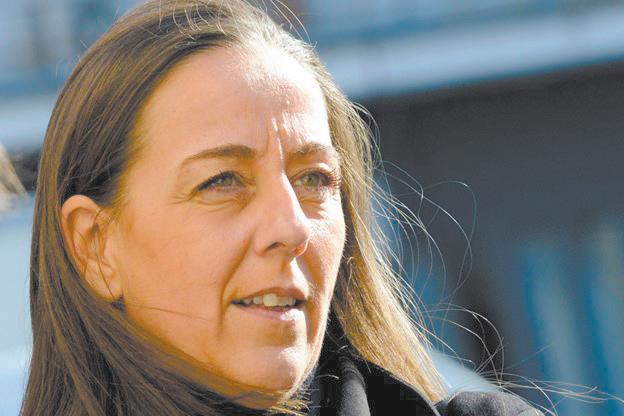

that Blitzer was selected to be honored “based on his reputation and his contributions to the industry, it’s still great that people feel a sense of pride or connection to him. It’s fantastic.”
“Thank you to Arizona State University’s Walter Cronkite School of Journalism and Mass Communication for this honor,” Blitzer said in a statement. “My mom and dad would have been so proud to see this moment.”
January 6
about her Judaism with her fellow council members and speaking out for her rights

station.
two became friends.
Meyers was so captivated by the essays that he reached out to Silverman, and the two became friends.
That’s how Stern first learned of the open council seat, but there’s no doubt she earned her position, Meyers said.
August 25
Blitzer’s parents were both Holocaust survivors, and many members of his family perished in Auschwitz. Blitzer was born in Germany and immigrated to New York in 1948 with his parents. While he was studying for his master’s degree at Johns Hopkins University School of Advanced International Studies, he spent time at the Hebrew University of Jerusalem and learned Hebrew.
January 20
January 6
February 3
January 20
February 17
anchor for “The Situation Room with Wolf Blitzer,” where he talks about politics and foreign affairs daily.
September 1
August 25
September 8
September 1
September 15
The committee who selected Blitzer felt he was “a perfect choice given the fact this was an election year,” said Ruben Olmedo, Cronkite’s associate director of development.
That’s how Stern first learned of the open council seat, but there’s no doubt she earned her position, Meyers said.
To become a council member, Stern had to apply and demonstrate that she had something valuable to contribute, he said.
She already has some practice at
about her Judaism with her fellow council members and speaking out for her rights
“One time, I was in class and someone called me the R-word and I told him not to. The teacher was in the hallway and another student repeated the word,” she said. Rather than letting the situation go, she told her theater teacher, who was able
She already has some practice at
“One time, I was in class and someone called me the R-word and I told him not to. The teacher was in the hallway and another student repeated the word,” she said. Rather than letting the situation go, she told her theater teacher, who was able
“If someone has a disability, saying the R-word is like saying the F-word,”
“If someone has a disability, saying the R-word is like saying the F-word,” Stern said.
While performing in the musical “Hairspray,” she had another occasion to tangle with the offensive word, which appears in the script.
for the award.
While performing in the musical “Hairspray,” she had another occasion to tangle with the offensive word, which appears in the script.
“That’s really bad and my friend said it on stage. I was not OK with that, so I went to the director and told her it was a bad word for people with disabilities, but she wouldn’t take it out,” Stern said.


March 10
February 3
February 17
March 24
March 10
March 31
March 24
April 7
March 31
April 21
April 7
May 5
April 21
May 19
September 8
October 6
As a young journalist, Blitzer worked in Reuters news agency’s Tel Aviv bureau before moving to the Jerusalem Post where he covered American politics and Middle East affairs for more than a decade. He also wrote in Hebrew for several Israeli publications and edited the monthly journal of the American Israel Public Affairs Committee (AIPAC). His first book, “Between Washington and Jerusalem: A Reporter’s Notebook,” focused heavily on the relationship between Israel and the United States.
May 5
June 9
May 19
July 14
June 9
August 4
July 14
August 18*
August 4
August 18*
October 13**
September 15
October 6
October 20
October 13**
November 3
October 20
November 10
November 3
November 17
November 10
December 1
In the late 1980s, Blitzer was the first journalist to interview Jonathan Pollard, the U.S. Navy intelligence analyst who was charged with spying for Israel. His subsequent book about Pollard, “Territory of Lies,” was a bestseller and propelled him to a new level of fame.
November 17
December 15
December 1
December 15
In 1990, he moved to CNN and quickly became the network’s White House correspondent. Blitzer has hosted several shows on CNN but is best known as the
“She’s on the council because she deserves to be on the council,” he said.
To become a council member, Stern had to apply and demonstrate that she had something valuable to contribute, he said.
“People in Cronkite have been captivated with the election and all eyes have been on Wolf, a major voice in election coverage. People are looking forward to having him on campus, and the community response has been amazing, too,” Olmedo told Jewish News.
“She’s on the council because she deserves to be on the council,” he said.
“As someone who grew up watching Walter Cronkite every night with my parents, I am honored to receive this award in his name,” Blitzer said in a press statement. “Cronkite led me to my career in journalism. He set an incredible example for all of us who report the news that continues to inspire young journalists today.”
Stern is creating a life and career as a member of her community, which makes her a great addition.
Stern is creating a life and career as a member of her community, which makes her a great addition.
Stern graduated from McClintock High School in Tempe last year and now attends Glendale Community College, with a focus on dance. She is a regular performer at Detour Company Theatre, a Scottsdale theatre company for adults with intellectual, developmental and physical disabilities.
“He’s really good for the Jewish community because he signals knowledge. He’s not only a smart guy and a solid anchor, but he has also represented important Jewish community issues, especially those related to Israel. He’s in a key position to effectively communicate that story to an international audience,” Shultz said.
Stern graduated from McClintock High School in Tempe last year and now attends Glendale Community College, with a focus on dance. She is a regular performer at Detour Company Theatre, a Scottsdale theatre company for adults with intellectual, developmental and physical disabilities.
“That’s really bad and my friend said it on stage. I was not OK with that, so I went to the director and told her it was a bad word for people with disabilities, but she wouldn’t take it out,” Stern said.
She let her mother know about the conflict and they were able to convince the director of the need to remove the word from the script.
While in town, Blitzer will meet with sponsors and Cronkite students, offering them a private Q&A session. He will then receive the award at a luncheon ceremony on Feb. 4, at the Sheraton Phoenix Downtown.
She let her mother know about the conflict and they were able to convince the director of the need to remove the word from the script.
“My friend Al was next to me when I told the director and he gave me the biggest hug ever and said that he loved me so much,” Stern said. Sadly, Al died in a car crash on Oct. 24, 2021.
Shultz has been pitching members of the Jewish community to buy tickets for the event, arguing that he is not just another honoree.
In fact, when Stern attended her first council meeting in January, she couldn’t wait to tell people of her involvement with Detour and share information about its upcoming shows.
“The Cronkite award seeks to continue the legacy of Walter Cronkite and what he represented to our society by delivering the news every day and being the most trusted man in America,” Batts said. Batts gave his seal of approval to Blitzer’s selection
In fact, when Stern attended her first council meeting in January, she couldn’t wait to tell people of her involvement with Detour and share information about its upcoming shows.
“There’s no question that she is going to thrive,” Meyers said. “She’s very gregarious and passionate about the things that matter to her.”
Heart Can’t Even Believe It: A Story of Science, Love and Down Syndrome,” Silverman’s book about her daughter. When Gesher’s speakers’ bureau, Damon Brooks & Associates, was asked to find a speaker about Down syndrome for an event this spring, Hummell first asked Silverman to speak, thinking Stern might be too young.
27
Heart Can’t Even Believe It: A Story of Science, Love and Down Syndrome,” Silverman’s book about her daughter. When Gesher’s speakers’ bureau, Damon Brooks & Associates, was asked to find a speaker about Down syndrome for an event this spring, Hummell first asked Silverman to speak, thinking Stern might be too young.
“That was hard; it’s very hard to get emotions out and I was very, very upset,” she said.
“My friend Al was next to me when I told the director and he gave me the biggest hug ever and said that he loved me so much,” Stern said. Sadly, Al died in a car crash on Oct. 24, 2021.
“That was hard; it’s very hard to get emotions out and I was very, very upset,” she said.
“He is an important Jewish honoree, and it’s important for the Jewish community to represent ourselves at the award ceremony to recognize the fact that ASU and Cronkite are honoring a guy who represents both historic, and future, Jewish thinking,” Shultz said. JN
On the recent anniversary of his death, Stern made a cake and took it to the crash site.
“I don’t know how I did it without crying. I’m so proud of myself,” she said.
On the recent anniversary of his death, Stern made a cake and took it to the crash site.
Amy Hummell, executive director of Gesher Disability Resources, agreed that Stern is a good fit for ADDPC because of her ability to self-advocate.
“I don’t know how I did it without crying. I’m so proud of myself,” she said.
They decided instead that Stern should tell her own story; it’s a real bonus that she is not afraid of public speaking.
Stern looks forward to sharing insights
“There’s no question that she is going to thrive,” Meyers said. “She’s very gregarious and passionate about the things that matter to her.”
For more information, visit cronkite.asu.edu/ about/awards/cronkite-award/.
Stern looks forward to sharing insights
Hummell co-hosted a book event with Meyers a few years ago for “My
Amy Hummell, executive director of Gesher Disability Resources, agreed that Stern is a good fit for ADDPC because of her ability to self-advocate.
Hummell co-hosted a book event with Meyers a few years ago for “My
12701 N. Scottsdale Road, Suite 201, Scottsdale, AZ 85254 Phone: 602.870.9470 | Fax: 602.870.0426 | editor@jewishaz.com | advertising@jewishaz.com subscriptions@jewishaz.com | www.jewishaz.com
602.870.9470 | editor@jewishaz.com |
12701 N. Scottsdale Road, Suite 201, Scottsdale, AZ 85254 Phone: 602.870.9470 | Fax: 602.870.0426 | editor@jewishaz.com | advertising@jewishaz.com subscriptions@jewishaz.com | www.jewishaz.com
subscriptions@jewishaz.com | www.jewishaz.com
PUBLISHER
PUBLISHER Jewish Community Foundation of Greater Phoenix
Jewish Community Foundation of Greater Phoenix
PUBLISHER
GENERAL MANAGER
Jewish Community Foundation of Greater Phoenix
SENIOR ACCOUNT EXECUTIVE Jodi Lipson | 602.639.5866 jlipson@jewishaz.com
ADVERTISING SALES CONSULTANT Jodi Lipson | 602.639.5866 jlipson@jewishaz.com
Rich Solomon | 602.639.5861 rsolomon@jewishaz.com
GENERAL MANAGER
ASSOCIATE PUBLISHER Rich Solomon | 602.639.5861 rsolomon@jewishaz.com
Rich Solomon | 602.639.5861 rsolomon@jewishaz.com
MANAGING EDITOR Mala Blomquist | 602.639.5855 mblomquist@jewishaz.com
MANAGING EDITOR Mala Blomquist | 602.639.5855 mblomquist@jewishaz.com
MANAGING EDITOR
STAFF WRITER
STAFF WRITER Shannon Levitt | 602.639.5854 slevitt@jewishaz.com
Mala Blomquist | 602.639.5855 mblomquist@jewishaz.com
Shannon Levitt | 602.639.5854 slevitt@jewishaz.com
STAFF WRITER
Shannon Levitt | 602.639.5854 slevitt@jewishaz.com
ADVERTISING SALES CONSULTANT Jodi Lipson | 602.639.5866 jlipson@jewishaz.com
SUBSCRIPTIONS 602.870.9470 x 1 subscriptions@jewishaz.com
SUBSCRIPTIONS 602.870.9470 x 1 subscriptions@jewishaz.com
GRAPHIC DESIGNER
GRAPHIC DESIGNER Ricki Urban | 602.870.9470 X 2 advertising@jewishaz.com
SUBSCRIPTIONS 602.870.9470 x 1 subscriptions@jewishaz.com
Ebony Brown | 410.902.2333 ads_phoenixjn@midatlanticmedia.com
GRAPHIC DESIGNER Ebony Brown | 410.902.2333 ads_phoenixjn@midatlanticmedia.com
“It’s not the same when someone tries to tell a person’s story for them,” Hummell said.
11 October 18** October 25 November 8 November 15
They decided instead that Stern should tell her own story; it’s a real bonus that she is not afraid of public speaking.
November 22
“It’s not the same when someone tries to tell a person’s story for them,” Hummell said.
Additionally, helping people with disabilities find jobs was one of the reasons for acquiring the bureau. Unemployment in the disability community is upwards of 75% and of that percentage, 75% are ready, willing and able to work — but haven’t been given the opportunity, Hummell said.
December 6
December13
December 20
Additionally, helping people with disabilities find jobs was one of the reasons for acquiring the bureau. Unemployment in the disability community is upwards of 75% and of that percentage, 75% are ready, willing and able to work — but haven’t been given the opportunity, Hummell said.
“People have it in them to speak up but don’t know how, and often they’re not cheered on. Sophie has family support
“People have it in them to speak up but don’t know how, and often they’re not cheered on. Sophie has family support

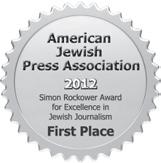



You count on us. And we count on you to help ensure that the Greater Phoenix Jewish community has quality, reliable news coverage every day. Please consider making a generous donation to support the Jewish News. Kindly fill out the form below, and return it with your check or credit card information in the envelope enclosed with this issue. We thank you, and the Greater Phoenix Jewish community thanks you!
Name or Company Name
Address
City State ZIP
Email Home Phone Cell
❒ I/We wish to remain Anonymous
❒ Enclosed is my check to the Jewish News for $
❒ Charge my credit card the amount indicated in the box to the right:
Visa
MC
Name as it appears on the card
Card #
Donations can also be made by major credit card by logging on to the Jewish News website at www.jewishaz.com/2024donation or by scanning the code:
Discover
Expiration Date (mm/yy) Security Code

When I think of the Jewish News, I think of family. I grew up with Jewish community journalism. My father’s good friend Bud Goldman founded the Jewish News in 1948, working from his garage.
My parents owned and published it from 1960 to 1980. They worked late hours, tirelessly nurturing a key pillar of our community, slowly growing staff, expanding coverage and delivering highprofile interviews.
My husband Paul and I purchased the Jewish News from my parents in 1980. When I took over as publisher, I was in the unique position of honoring both my parents and our readers. When I retired in 2013, our coverage had grown along the expanding community we served. We had a robust staff of writers,
advertising salespeople, graphic artists and administrators.
Today’s Jewish News is a nonprofit, with a small staff (more people than my two parents, but fewer than when we were in our heyday). But the newspaper retains its vibrant spirit, reporting and storytelling that show how our diverse community thrives no matter the challenge.
Paul and I are grateful for our family’s legacy carried forward by a new generation of journalists. The tireless work ethic remains. Award-winning storytelling enriches every issue. When I identify a story, I think the Jewish News should share, I am always delighted to see the newspaper is already covering it.
I know all too well the joys and the challenges of running a newspaper. And
no matter how much time passes, no matter whose hands are penning the stories and building the issues, some challenges never go away. So, I ask you to consider supporting the Jewish News. The nonprofit Jewish News is the only source of print journalism in Jewish Arizona. It needs all our help. Jewish News belongs to our community. And if we all join together, we can unite in a shared vision of storytelling, of growth, of healthy development that reshapes the way our community connects.
Ask yourself, “If not now, when? If not me, who?” JN
Flo Eckstein, Publisher Emeritus, Jewish News
“These rabbis are still reeling from what happened to their colleague,” Ceitlin wrote on Facebook.
Ceitlin shared that Deputy Inspector Thomas Smith, a New York Police Department commanding officer in the 71st precinct, came to the reception to offer his personal support and encouragement.
“He expressed his shock at what happened and said he stood shoulder to shoulder with the Jewish community anywhere they were experiencing antisemitism and hate,” Ceitlin wrote.
Smith talked about growing up in Boro Park in Brooklyn and described how he helped his observant Jewish neighbors by turning their lights on and off for them during Shabbat because they were forbidden from doing so.
He also told the Chabad rabbis gathered at the reception that he had helped with the permit to install a Chanukah menorah in Manhattan, something Chabad rabbis do every year.
“I’m now trying to help get one at the Holland Tunnel,” he told them. “People are afraid of what they don’t know, so we need better connections between communities and faiths so we can all get along better.”
Chabad-Lubavitch emissaries, known as shluchim, are husband-and-wife teams who
dedicate their lives to Jewish outreach, often in remote locations without established Jewish infrastructure.
This was the first year Rabbi Yaakov Cahnman attended as a representative of the year-old Chabad of Rural Arizona. He works in Arizona’s White Mountain communities and puts a lot of mileage on his car trying to reach the state’s most farflung Jews.
Cahnman was “inspired by how so many individuals are heeding the Lubavitcher Rebbe’s call to instill Jewish pride in their communities and to bring spiritual light to a world that appears to be filled with the opposite,” he told Jewish News in an email.
Shluchim try to reach both affiliated and unaffiliated Jews, welcoming everyone from all walks of life. Deitsch said the work is about figuring out “how to reach out to the Jews that don’t want to be reached.”
The first day of the conference was a chance to catch up with old friends and colleagues and attend workshops.
Some of the meetings were a chance to meet new friends, even before the start of the official conference, and were completely unexpected.
Ceitlin was waiting at his gate at the Phoenix airport before his flight to New York when a fellow rabbi approached him.
The young rabbi had just finished putting on tefillin when he looked up and said bluntly, “You’re Ceitlin.”
Ceitlin was surprised but responded that he was.
“What’s your relation to Rabbi Yechiel Yosef Ceitlin?” the stranger asked.
“He’s my uncle,” Ceitlin replied.
The man told Ceitlin that he had become religious thanks to his uncle.
“I grew up in Winnipeg and moved around a lot during my youth. While at Concordia University in Montreal, I asked at Chabad who could teach me to put on tefillin. They asked where I lived and then sent me to the nearest person who could help — your uncle.
“I went to his house. At first, he didn’t understand why I came to him specifically, but I explained that I was sent to him. He welcomed me in and helped me wrap tefillin and pray.
“I kept coming back, and he taught me more and more. We did this every day for six months. He and his wife, Chani, were very kind and often invited me for Shabbos meals.”
Now, Daniel Hudson (the young rabbi) is an intern at Chabad at Northern Arizona University in Flagstaff, “where he helps Jewish students connect with their faith — just like my uncle helped him,” Ceitlin wrote on Facebook.
On the final morning of the conference, rabbis gathered for the annual “class picture” under the iconic gables of 770 Eastern Parkway, the headquarters of the Chabad-Lubavitch movement. The photo,
featuring thousands of black-hatted rabbis, is an annual conference tradition. Rabbis from across the world posed in the happy portrait.
The final event is a gala banquet at the New Jersey Convention and Expo Center, filled with thousands of Chabad rabbis and their guests.
There were words of consolation for Kogan’s family and prayers for Israeli soldiers. Emblematic of the Chabad ethos of reaching out to all Jews, no matter the obstacles, Rabbi Yehoshua Soudakoff, director of Chabad for the Deaf Community in Israel, shared his unique story of living a life of observance as a deaf Jew.
“The voice you hear is not mine, but the words definitely are,” he said through an interpreter. “It is hard for a deaf person to find a place within the community. Torah and mitzvah while deaf is difficult. That is why I established Chabad for the Deaf Community. There are deaf Jews and Jews with various disabilities throughout the world. Let us continue our holy work to reach out to every single one of them and inspire them, just as I was once inspired,” he told the captivated audience.
Then the thousands of rabbis danced together before saying their farewells until next year. JN


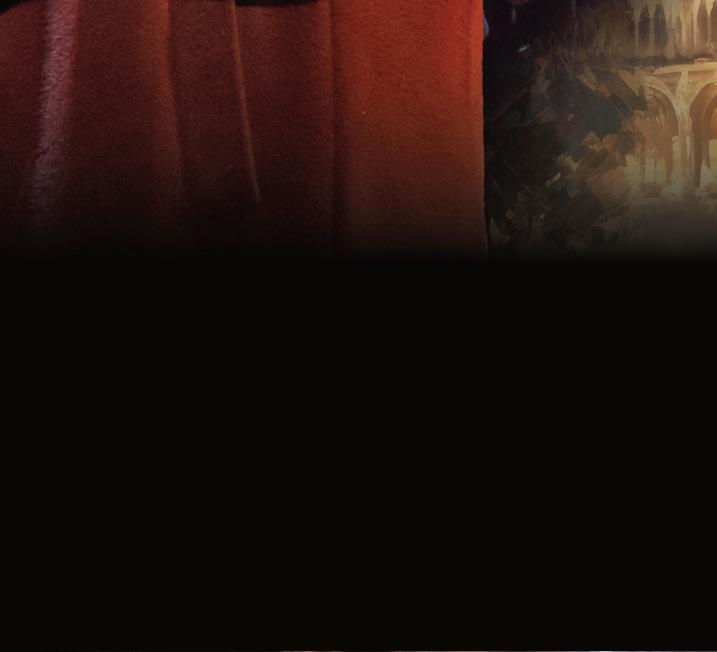




SHANNON LEVITT | STAFF WRITER
Roni Lior pulled a stuffed dog from her bag at one point during her presentation to demonstrate a concrete example of how she and her colleagues at the American Jewish Joint Distribution Committee (JDC or the Joint) assist traumatized Israeli children since Oct. 7. The dog-shaped doll, or Hibuki, has arms that can easily be wrapped around a child to feel like a hug (‘hibuk’ is Hebrew for ‘hug’), and velcroed hands that enable it to be carried around easily. The expression on the Hibuki’s face is neutral, perhaps even a little wistful, allowing a child to project their own difficult-toarticulate feelings onto it.
“We see very young children who have been exposed to trauma hide their emotions, fears, anxieties, stress and this sometimes can’t come out, or comes out negatively with aggression,” Lior told a group of people gathered at the Ina Levine Jewish Community Campus on Tuesday, Dec. 3.
“We train both the children and parents how to communicate using the Hibuki to share their feelings,” she explained.
Lior, an Israeli member of the Joint’s emergency team in Israel, spoke specifically about what she and her team have been doing to cope with the overwhelming emotional fallout on vulnerable Israelis over the last year.
Lior was joined by Shawna Dolinka, JDC’s director of strategic partnerships. Dolinka, who is based in Oregon, represents the organization to its partners, including the Center for Jewish Philanthropy of Greater Phoenix (CJP), in the Western United States.
Dolinka explained that while Israel has necessitated much focus since Oct. 7, the JDC has been a leading Jewish humanitarian assistance organization since 1914, when it was established to aid starving Jews in Jerusalem, and is now present in more than 70 countries worldwide. Its work in those countries varies widely, ranging from responding to the crisis in Ukraine, to helping with elderly care to establishing Jewish institutions and training Jewish leaders, providing stability in economic turmoil and responding to natural disasters and other global crises.
“If you’re going to boil what we do down into two simple sentences, we help save Jewish lives and build Jewish life across the globe. We’re really there for Jewish communities in need, wherever it is that we need to be, and to empower Israel’s most vulnerable, who now include

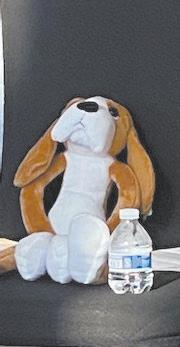
millions impacted by the war,” she said.
Before Oct. 7, JDC-developed programming and social services helped more than a million Israelis every week. Since the Hamas attack, the Joint has assisted more than 550,000 of the hardest hit Israelis with emergency services. Many of those are children.
Lior, the deputy director of Israel’s National Youth Department, explained that though nobody understood the scale of what was happening on Oct. 7 at the time, “we did know something very big was happening and that we needed to do whatever was necessary.” Some of the first people she and her team encountered who needed help were the young people who witnessed the horrors of that terrible day.
“We realized that we need to do what we already know how to do — help the communities prioritize the care for the most vulnerable and the newly vulnerable,” she said. That meant finding and helping children, the elderly, people with disabilities and those who were evacuated and displaced — people who lost businesses and the newly injured and disabled, including reservists returning from battle.
JDC quickly created 200 daycare centers for thousands of displaced people, understanding that it could be years before people are able to return home when it is possible or establish new ones when it is not.
The organization also set up preschools, elementary schools and high schools, so that children could have a sense of normalcy and continue their education.
Collaborating with Israel’s Ministry of Education, the Joint also created “a vast
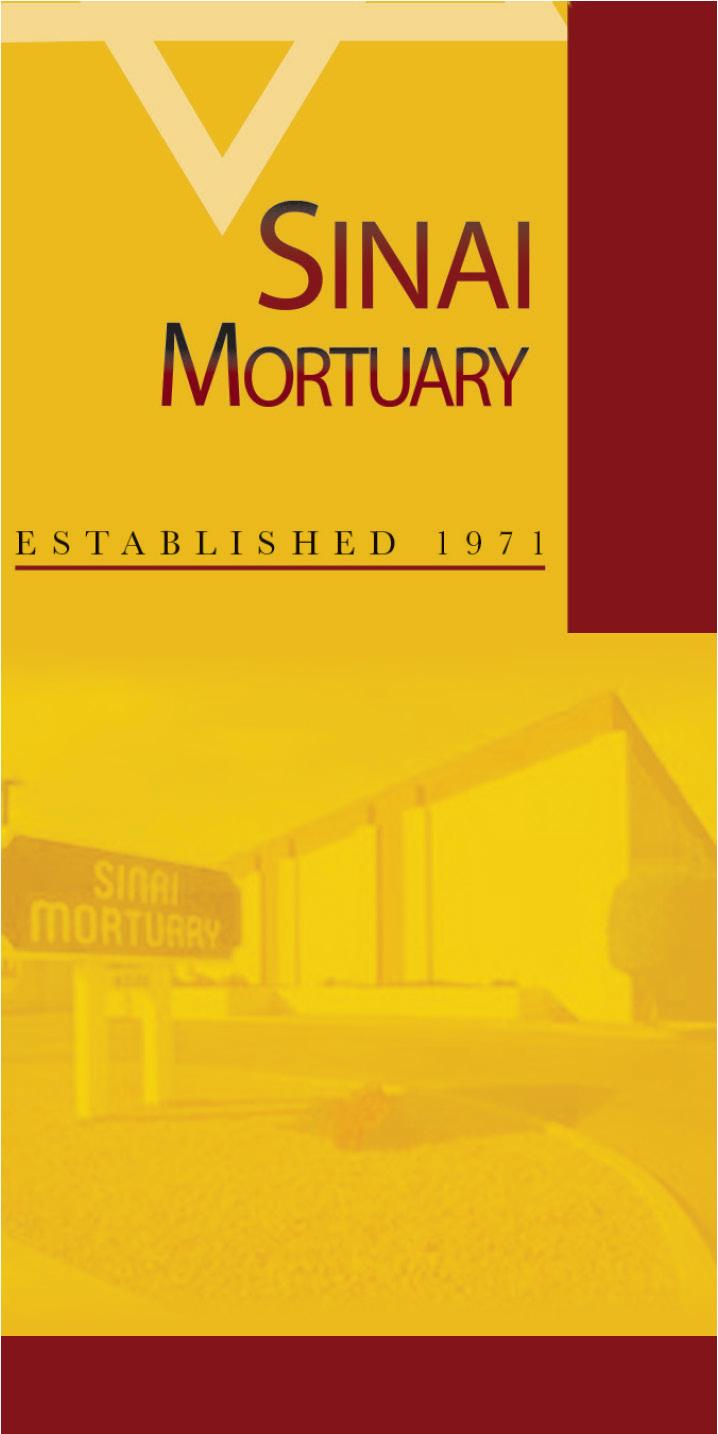
platform for trauma therapy for children,” Lior said.
That’s when she brought out Hibuki, a project of JDC, the Israeli Ministry of Education and Tel Aviv University, to demonstrate the hands-on healing tool, which was first introduced in 2006 following Israel’s second war with Lebanon. Hibuki is a safe way for kids to talk about their emotions, and especially now, their fears — even when those fears scare adults. When children talk about Hibuki “seeing the terrorists,” Lior and her colleagues tell parents and teachers not to turn away but to ask the kids what would make them feel better in that situation.
Often, a child will say something like, “Hibuki feels better when Mommy gives him a hug.” Something so seemingly simple has been very effective for thousands of traumatized children using the Hibuki tool method, Lior said.
Currently, kids aged two to eight or nine are using the dolls, but Lior said that there are ongoing tests about incorporating play into trauma therapy for older kids.
After Lior spoke, several people thanked her and Dolinka for the invaluable work they do on behalf of Jews around the world.
“The Joint is one of CJP’s historic partners. It’s important to share with our community here in Arizona the critical work that we’re supporting in Israel and overseas,” CJP Vice President of Community Engagement Kaylie Medansky told Jewish News. Medansky organized Tuesday’s event. JN
For more information, visit jdc.org.


MALA BLOMQUIST | MANAGING EDITOR
Professional advice and cautionary tales were both on offer for the more than 350 tax and legal professionals gathered at the Arizona Biltmore on Nov. 1 for the 2024 Tax & Legal Seminar presented by the Center for Jewish Philanthropy of Greater Phoenix (CJP) and the Arizona Community Foundation (ACF).
“This is our largest presence since before the pandemic,” noted event chair Erin Itkoe, CPA and director of financial planning at Tarbox Family Office.
The annual Tax & Legal Seminar serves as an education and networking opportunity for Arizona’s leading estate planning attorneys, CPAs, insurance agents, CFPs and other financial planning professionals.
Attendees can receive up to four hours of continuing education credits in their field.
Past events have varied in format, including panel discussions, combined presentations and national and local speakers.
The Tax & Legal Seminar was developed by the Jewish Community Foundation (now CJP) in 1993 to provide an educational opportunity to the estate planning professionals in the Valley. In 2001, the program expanded by collaborating with ACF as a co-sponsor of the event.
“This year, we exceeded our attendance and sponsorship goals,” said Rachel Rabinovich, director of special projects for CJP. “I appreciate all the relationships I’ve established with our attendees, committee members and sponsors, and I especially enjoy getting to know our outstanding presenters. I am proud of this year’s event and our partnership with the Arizona Community Foundation.”
This year’s presenters were Beth Shapiro Kaufman and Justin Miller.
Shapiro Kaufman has decades of experience providing advice on
sophisticated estate planning issues with an eye toward tax efficiency. She served in the U.S. Treasury Department’s Office of Tax Policy, first as an attorney advisor and then as an associate tax legislative counsel, where she had principal responsibility for all tax policy matters affecting trusts and estates.
A little-known fact about her is that she used to do jazzercise with the late Supreme Court Justice Ruth Bader Ginsburg.
She was born and raised in Phoenix and graduated from Arcadia High School.
“My parents thought I was insane to leave,” she shared. “They’re not with us any longer, so they can’t complain about that now.”
She said that she was glad she was the first speaker that morning because Justin Miller, who was speaking after her, is very funny.
“I want you to think of my presentation as the vegetables that you need to eat,” she said and explained that Miller’s presentation would be dessert.
Shapiro Kaufman’s presentation was a “Washington update” regarding actual regulations and other guidance that the IRS has put out, all relevant for the attendees’ areas of practice.
She spoke about something she has become familiar with in recent years, the Financial Crimes Enforcement Network (FinCEN), a bureau within the U.S. Department of the Treasury that collects and analyzes information about financial transactions to combat domestic and international money laundering, terrorist financing and financial crimes.
“Not where you’d expect to find estate planners dipping their toes,” she said. “But because these are issues that affect our clients, you really have to be somewhat well-versed in them.”
She recommended that if someone had a client making a number of filings
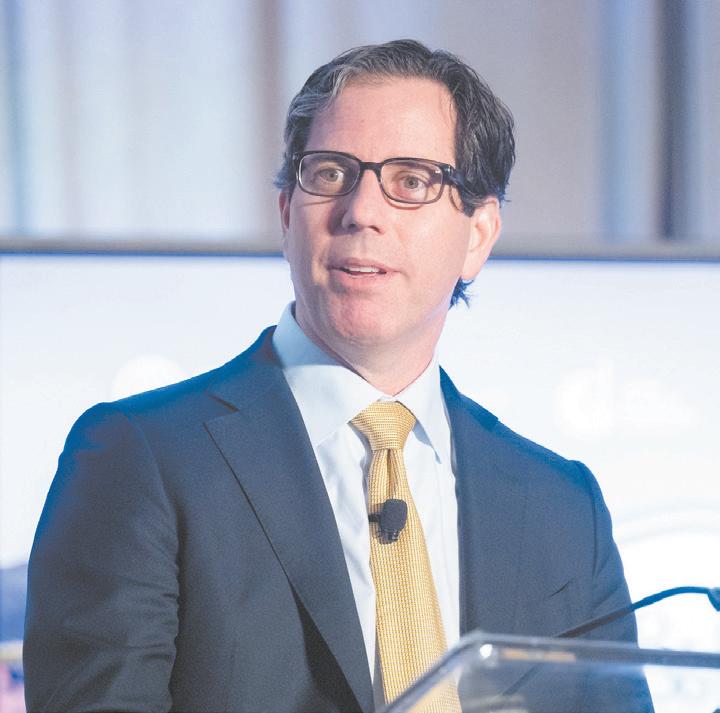

because they have several entities, the simplest thing to do is to obtain a FinCEN identification number.
“I have one myself. All the cool kids have one, so you should just get one,” she joked.
Since the outcome of the 2024 election was unknown at the time of this event, Shapiro Kaufman also discussed the “sunset” of the double estate tax exemption on Dec. 31, 2025, resulting in an exemption for 2026 somewhere between $7 million and $7.25 million, depending on inflation.
Since 2017, taxpayers have benefited from the historically high gift and estate tax exemptions introduced under the Tax Cuts and Jobs Act. This legislation doubled the exemption for 2018 from approximately $5.5 million to $11 million per person adjusted for inflation and in 2024, it rose again to $13.61 million per person. Time will tell if Congress takes the action needed to keep the exemption.
Attendees took a break after Shapiro Kaufman’s presentation, where they could get a snack and network.
is that he is also a children’s author. He talked about charitable tax planning and “helping get the biggest deduction for the taxpayer.”
He explained that many people donate clothing and use the receipt as a deduction on the tax return, but a donor can deduct a charitable contribution of $250 or more only if the donor has a written acknowledgment from the charitable organization.
He shared the story of one individual who made 173 separate trips to Goodwill, keeping each donation under $250. At the end of the year, they claimed $25,000 in clothing donations.
“He had all these receipts. I don’t know if they maybe just picked up a stack. Who knows if it was honest,” he said.
In the end, the taxpayer did not receive a deduction because the IRS was looking for a written acknowledgement letter from Goodwill and, since it amounted to more than $5,000 total, a written appraisal.



Victoria C. Harris, CPA, managing partner at the Scottsdale-based public accounting firm Hunter Hagan & Company Ltd., agreed that it’s a great networking event and a good way to get people in the industry together. “I know a ton of people here, and I meet new people who are all in the same industry,” she said.
Attorney Mark Bregman of the firm Dyer Bregman Ferris Wong & Carter, PLLC in Phoenix, said he has been coming to the Tax & Legal Seminar for at least 20 years.
“You get a lot of good information, and it provides an opportunity for the entire estate planning community to come together. CPA’s estate planners, lawyers — everybody knows somebody here,” he said.
Next, Miller took the stage. He is a partner and national director of wealth planning at Evercore Wealth Management’s San Francisco office. His little-known fact
“It’s not always taxpayers behaving badly or trying to get around something. Sometimes it’s honest mistakes, and we have to be very careful as advisors how we help people,” said Miller.
In 2023, he said charitable donations coming from the U.S. were $557 billion, and 67% of it came from individuals.
“These are our clients,” he said. “Let’s help them do it more tax-efficiently.”
Ian Sachs, president of Risk Resource, an Arizona-based life insurance firm located in Scottsdale, told Jewish News it was his first time attending the event.
“There was a lot of substance here, good content. It’s the perfect way to spend a Friday in the tax and legal community.” JN
For more information, visit phoenixcjp.org/ what-we-do/professional-advisory-resources.
Jewish News is published by the Jewish Community Foundation of Greater Phoenix, a component of the Center for Jewish Philanthropy of Greater Phoenix.
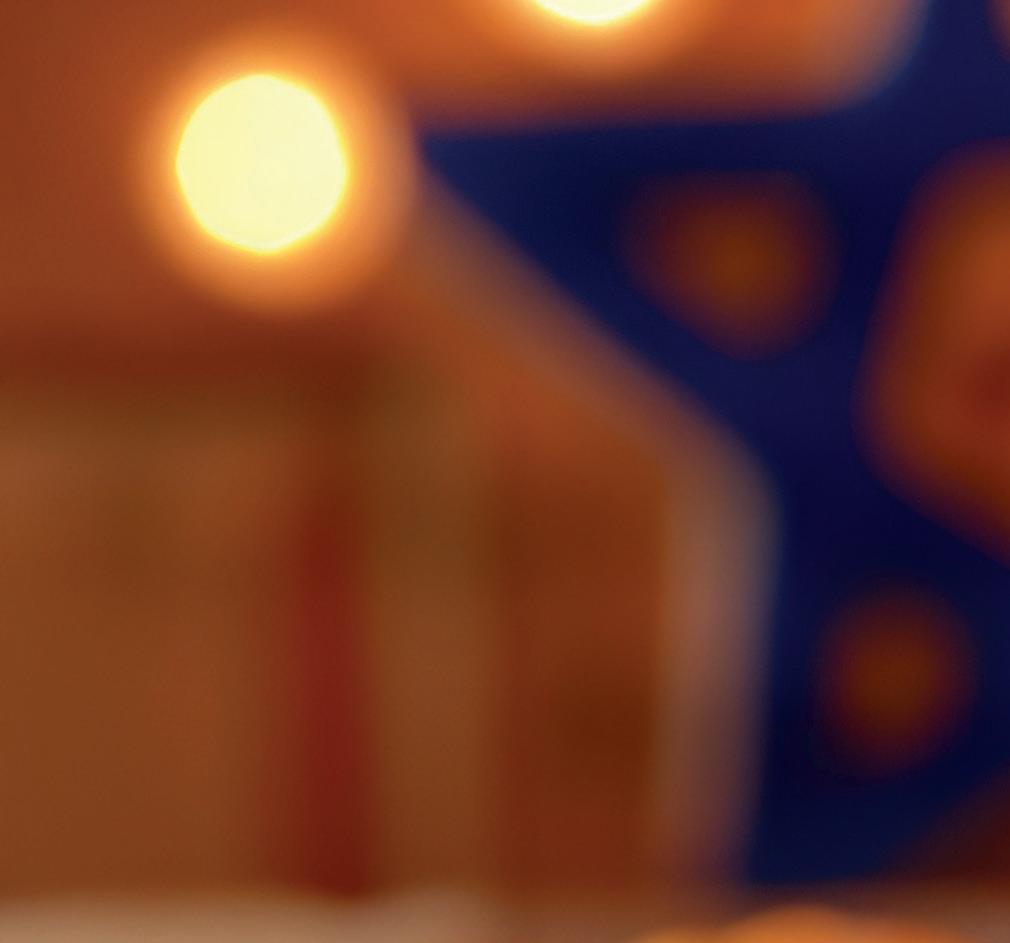


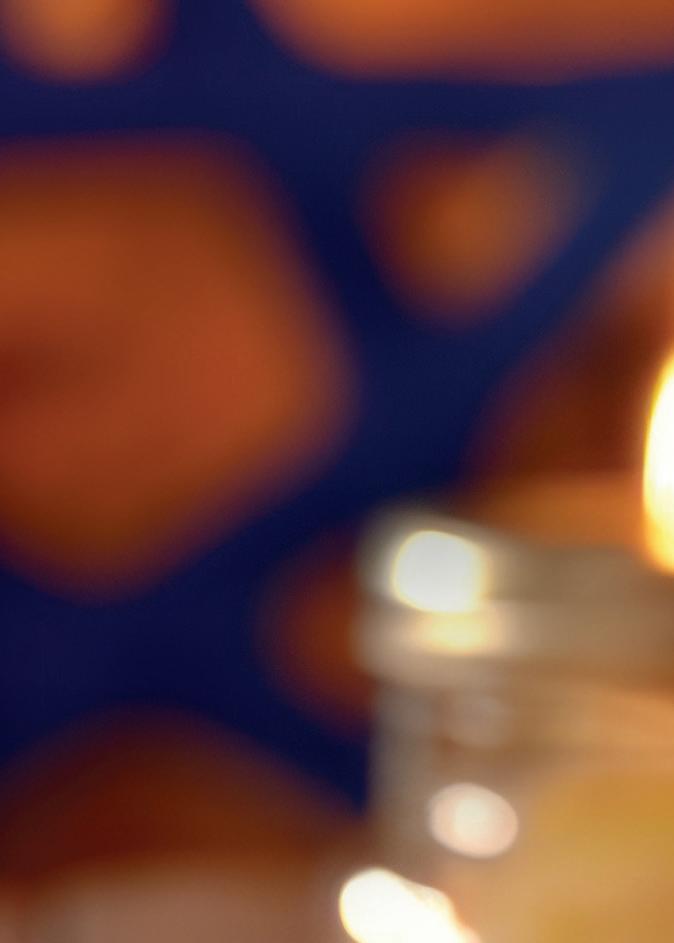

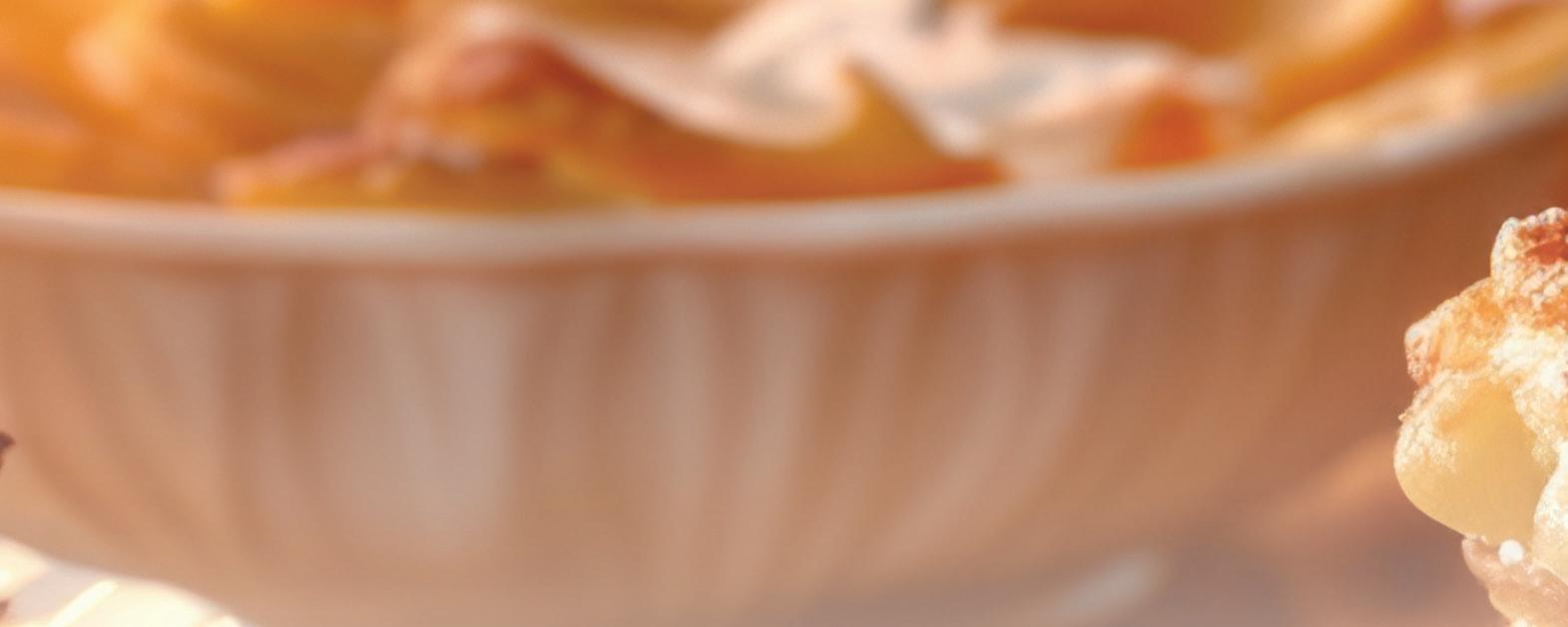




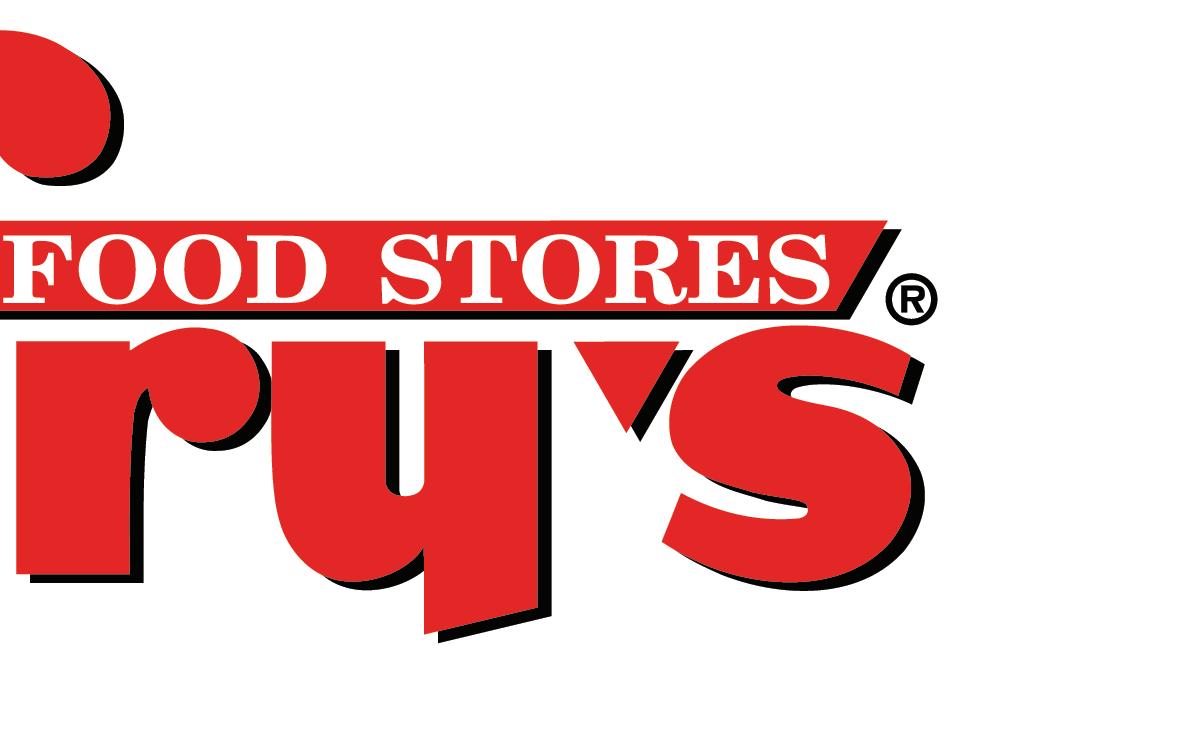

RON KAMPEAS | JTA
ON DEC. 11, PRESIDENT BIDEN ANNOUNCED THE ENACTMENT OF THE “COMMISSION TO STUDY THE POTENTIAL TRANSFER OF THE WEITZMAN NATIONAL MUSEUM OF AMERICAN JEWISH HISTORY TO THE SMITHSONIAN INSTITUTION ACT.
President Joe Biden signed into law a bill that could bring the country’s premiere Jewish history museum under the Smithsonian umbrella, a measure that may help ensure the survival of an institution that faced bankruptcy just a few years ago.
On Dec. 11, Biden announced the enactment of the “Commission to Study the Potential Transfer of the Weitzman National Museum of American Jewish History to the Smithsonian Institution Act.” The act establishes a body that will examine whether the Philadelphia museum, known as the Weitzman, can
join the Smithsonian Institution.
The U.S. House of Representatives approved the bill, authored by Rep. Debbie Wasserman Schultz, a Florida Jewish Democrat, in September and the Senate followed suit on Dec. 4. Both votes were unanimous. The bill had the support of 36 Jewish groups.
If the commission created by the bill transfers the museum to the control of the Smithsonian trust, it would join a collection of Smithsonian museums dedicated to other minority groups including African Americans, Asian Americans, Native Americans and Latinos.
“Jewish Free Loan values the Jewish News as an essential community resource and trusted partner. Their feature stories and advertising opportunities, both in print and online, enhance community engagement and increase awareness of available services. Collaborating with the Jewish News amplifies our outreach to potential borrowers and donors, while fostering stronger connections with local partners.”
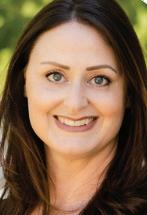
Ellie Friedman Sacks Executive Director, Jewish Free Loan
Email advertising@jewishaz.com for more information.

In floor speeches lawmakers cited the spike in antisemitism since Hamas launched its war against Israel on Oct. 7, 2023, as a spur. But the effort to bring the museum under the umbrella of a system that includes federal government support predated the attacks.

The museum was on the cusp of closure four years ago. In early March 2020, right as COVID-19 hit, the museum filed for bankruptcy protection in the face of a $30 million construction debt. It was rescued the following year by a donation from footwear entrepreneur Stuart Weitzman, giving the museum its current name, and was in good financial health when the bill was first proposed earlier this year.
The museum last month named as its new CEO Dan Tadmor, an Israeli who oversaw the $100 million transformation of a Tel Aviv museum called Beit Hatfutsot, which reopened in 2021 as ANU-Museum of the Jewish People. The Weitzman regained its financial footing under Tadmor’s predecessor, Misha Galperin.
The Smithsonian, a trust, runs its museums with a combination of fundraising and federal appropriations, with percentages varying among its many institutions. Most Smithsonian museums are in Washington D.C. and have free admission, although several are further afield, including the Cooper Hewitt Smithsonian Design Museum in Manhattan. The Weitzman already offers free admission through philanthropic support.
The commission of eight people studying the feasibility of the move will include eight voting members appointed by leaders of both chambers of Congress. Their report to Congress on the feasibility of the museum joining the Smithsonian would come within two years of the commission’s launch. JN

In our Torah portion this week, Vayeishev, we find ourselves immersed in the troubled family dynamic of Jacob and his sons. Rachel has passed away, leaving Jacob with the two sons she bore for him after years of barrenness — Joseph and Benjamin. Joseph is Jacob’s favored son, a dreamer who is a somewhat immature and naïve youth. Joseph’s older brothers find him increasingly irksome and are driven to plot to kill him when Jacob sends him to check on them and their flocks. Instead of simply killing him, they opportunistically sell Joseph into slavery to a passing Midianite caravan. Taking his ornamented garment — that famed coat of many colors — and dipping it into goat’s blood, they dupe their father Jacob into believing that Joseph has met a bloody, unfortunate demise.
Our parshah continues as Joseph is even-
tually sold to an Egyptian household. His master, Potiphar, is a high-powered official in the royal court and Joseph quickly earns his favor, rising to a position of trust and authority in Potiphar’s estate. His relatively comfortable position, however, is threatened when Potiphar’s wife makes repeated attempts to seduce Joseph. After one particularly brazen such episode, he flees outside, leaving behind in her quarters his outer garment. She then uses this garment to deceive the household servants and then Potiphar himself into believing that it was in fact Joseph who attempted to seduce her, prompting Potiphar to have Joseph incarcerated in the royal prison.
In both of these instances, Joseph’s outer garments serve not only as markers of his identity but also as his adversaries’ means of deception. Perhaps even more importantly, in both cases, Joseph’s garments were also symbols of status. The same phrase used in our Torah portion for the ornamented garment, ketonet passim, is also used in II Samuel 13:18-19 to refer to the distinctive dress of virgin daughters of royalty. The scholar Nachum Sarna notes that several examples in Ancient Near Eastern art show
individuals wearing multi-colored robes or tunics, indicating a certain social standing. Similarly, the article of clothing taken from Joseph by Mrs. Potiphar was an outer garment worn only by a certain socioeconomic class; the poor would possess only one garment, not outer and inner layers of clothing. Joseph’s clothing, symbols of status and favor, are part of what gets him into trouble time and time again. Viewing Jacob’s favoritism of Joseph and the resulting ornamented tunic as of great consequence in the narrative of our Torah portion and thus within the history of our entire people, the Babylonian Talmud (Shabbat 10b) states, “Because of those few ounces of wool (the ‘coat of many colors’ Jacob gave Joseph), our people were enslaved in Egypt.”
One important lesson that can be drawn from our Torah portion is, therefore, to be wary of the material status symbols that are so prevalent in our own day, and that flash across our screens at this time of year. Joseph’s plight reminds us that we must not be deceived by these status symbols; any esteem afforded by a material item is fleeting and superficial at best. Life is not more content or more meaningful for those who
have purchased the name brand item on everyone’s list. Each year, trends change, yet what is truly important and valuable in life is constant: friends and family, the blessings of health and security, our ability to give and receive love and our striving to partner with God in tikkun olam, helping to create a more healed and just world.
As Chanukah approaches and we tackle that list of gifts we intend to buy, let us be reminded that the gifts that truly affect our lives and the lives of those around us do not change: kind words, loving acts, support and caring. And there is not an item or a garment on this earth, no matter how ornamented or brightly colored, that can take their place in our lives. These gifts of ourselves bring holiness, warmth and light into our lives during this darkest season of our year. Let us remember to give these greatest gifts above all else. JN
STUART SCHEAR | JTA
Like Dave and Benji, the oddly matched cousins in Jesse Eisenberg’s new feature film, “A Real Pain,” I recently embarked with five of my American Jewish cousins on an unusual family heritage journey to Poland. We were inspired by a powerful idea: bringing back to Poland a Jewish tallis, that one of our ancestors brought to the United States nearly a century ago.
That ancestor was Max Lang, my greatgrandfather on my mother’s side of the family. I had never met him, as he had died before I was born. Even so, Max’s life story is a thread that binds us together as a family. Max was born in 1884 into a Hasidic family of bakers in Nowy Zmigrod, Poland. At the age of 17, he emigrated to the United States and settled in New York.
Prosperous by the late 1920s, Max could afford to travel to his hometown in Poland to visit his large religious family. By that time, Max was no longer an observant Jew. Max’s non-religiosity aside, during that
visit his observant brother Pinkhas presented him with a gift — a magnificent tallis, which boasted a neckband, or atarah, embroidered with silver thread.
When Max returned to New York, with the tallis in his luggage, he had no idea that he would never see his family again.
In 1939, German forces occupied Nowy Zmigrod. On July 7, 1942, they murdered nearly all the town’s Jews, including Max’s cousins, in a nearby forest.
In 2023, I “friended” on Facebook some young Poles from Nowy Zmigrod who were interested in their town’s Jewish history. They helped me research my family history and encouraged me to visit the town in July, when local Christians hold an annual ceremony honoring the memory of the town’s Jews. When I decided to attend, I remembered that my cousins had Max’s tallis, and I asked them if I could bring it with me to Nowy Zmigrod.
Even though I am not religious, I wore
Philanthropy, Jewish Federation of Greater Phoenix, Cleveland Jewish
the tallis while speaking at the memorial, so that its beauty could represent the members of our large family who had been killed.
Upon my return from Poland, I organized a family Zoom to share the details of my visit. I told them that the director of the local museum in Nowy Zmigrod had asked me to donate Max’s tallis to the town museum. My cousins found the idea intriguing, but, as I had seen how poorly this modest, under-resourced museum cared for its collection, we decided it was too risky to donate it there.
Still, the idea of returning Max’s tallis to Poland inspired us, and we decided to offer it to the POLIN Museum of the History of Polish Jews located in Warsaw.
The museum believes that sharing the 1,000-year history of Polish Jews makes Poland a more inclusive, multicultural society. Despite intolerant voices in Poland speaking against Jews, gay people, Roma, Muslims and Ukrainians, a growing num-
clarity. Unsigned letters will not
ber of Poles have, for decades, taken a powerful interest in understanding their country’s Jewish past, which they view as a key to Poland’s future as an inclusive, multiethnic democracy. Given our family’s deeply felt commitment to Jewish dignity, to human rights for all people and to multiethnic democracies, my cousins and I concluded that POLIN was the perfect home for Max’s tallis.
By sharing this tallis, we are playing a small role in healing some of the harsh history experienced by Polish Jews over the centuries and bridging the divide with contemporary Poles of good will, who are drawn to understanding this complex history. JN
The views and opinions expressed in this article are those of the author and do not necessarily reflect the views of JTA or its parent company, 70 Faces Media. This piece has been edited for space. Read it in its entirety on JewishAZ.com.
JANET SILVA | SPECIAL TO THE JEWISH NEWS
As the end of the year approaches, many of us are thinking of charitable giving and tax planning. The state of Arizona allows you to do both. By participating in Arizona’s tax credit programs, you can provide the gift of education, or support programs that offer much needed assistance to members of the community.
When you donate to a qualified organization, you receive a dollar-for-dollar tax credit against your state tax liability and at the same time support nonprofit organizations. Arizona’s tax credits include the Qualifying Charitable Organization (QCO), Private School Tuition Organization (STO), Qualifying Foster Care Charitable Organization (QFCO), Arizona Military Family Relief Fund and Public School.
There is also a low-income corporate private school tuition program for businesses that has its own requirements and deadlines. If interested in the corporate program, call a school tuition organization (STO), such as the Jewish Tuition
Organization (JTO), or visit the Arizona Department of Revenue website at azdor. gov for more information.
Each qualifying organization offers unique programs to fill the needs of the community. Programs vary depending on the organization and include tuition assistance, helping with medical and living expenses or meeting special need requirements, providing the donor with an opportunity to support a range of causes close to their heart.
Married taxpayers can take advantage of the credits for a total of more than $5,800, single taxpayers can receive credits of more than $2,900. Each tax credit has a maximum amount that varies, and donations can be divided among organizations within tax credit programs but cannot exceed the maximum amount for that category. For example, the 2024 maximum amount for the private school tuition tax credit is $1,459 for individual taxpayers and $2,910 for married couples. A taxpayer can give the maximum to one STO,
or they can divide their support among several STOs; however, the total cannot exceed the maximum amount allowed for the private school tuition tax credit. The various qualified organizations and details for each type of credit can be found on the Arizona Department of Revenue’s website.
Each year brings new opportunities for your support. You will want to confirm the amount you can give to each organization, or if programs have changed that you would like to support. While taking the tax credit doesn’t impact your family budget, it makes a big difference to the members of our community that receive the help your donation makes possible.
The East Valley Jewish Community Center, Gesher Disability Resources, Jewish Free Loan, Kivel Campus of Care, Jewish Family & Children’s Service and Jewish Tuition Organization have a collaborative website that makes it easy for taxpayers to support these organizations. The Jewish Tuition Organization is a school tuition organization, and the other five members



of the collaborative group are qualifying charitable organizations. The group came together more than a decade ago to make it easy for the community to support organizations of choice at one time, either through a brochure mailing that goes out at the end of the year or at jewishtaxcredit. org. This year, the Qualifying Charitable Organization tax credit maximum amounts are $470 for individuals and $938 for married couples. As with STOs, you can give the maximum to one qualified charitable organization or divide the maximum amount among several organizations. When you support a Jewish tax credit organization, you make an impact that will echo in the community well into the future, and you are choosing a cause that is meaningful to you. As you prepare your 2024 taxes, take the credit and help a student, family or person in need. JN
Janet Silva is the executive director of the Jewish Tuition Organization. For more information, visit jtophoenix.org or jewishtaxcredit.org.





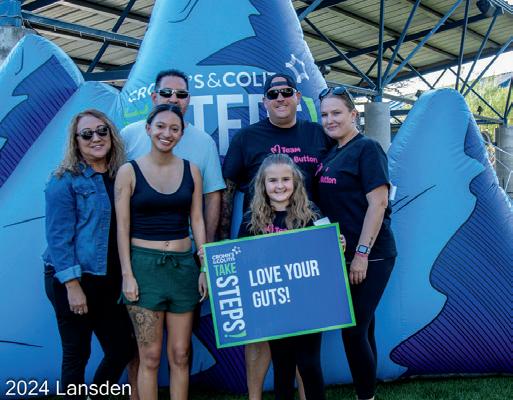


The Crohn’s & Colitis Foundation is the trusted source for people living with inflammatory bowel disease (IBD), educating, guiding, and supporting them every step of the way.
We’ve played a role in every major breakthrough in IBD research We’re changing laws to protect patients’ access to care We give people with IBD a vibrant community of support And that’s not all.

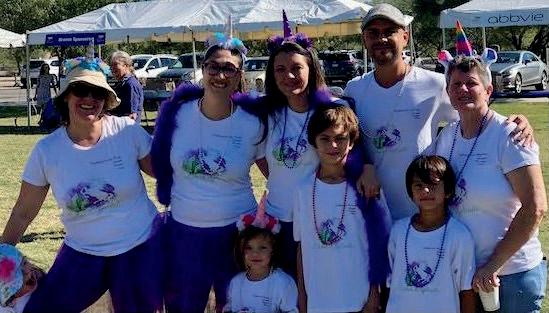



RICHARD KASPER | SPECIAL TO THE JEWISH NEWS

Jewish organizations today face the challenge of nurturing future leaders and professionals who can uphold our community’s values while navigating a rapidly changing world. As we look ahead, it’s crucial to invest in strategies that will build a generation of Jewish leaders prepared to carry forward our traditions, advocate for our community and engage meaningfully in an interconnected global society. Following are a few steps we can take today to develop tomorrow’s Jewish leaders.
1. Cultivate a sense of Jewish identity early on
The foundation for strong leadership often begins with a strong sense of identity. Jewish youth who feel connected to their heritage, values, and history are more likely to see themselves as stewards of the community. Engaging children and teens in programs that foster Jewish identity — whether through Jewish day schools, youth groups, summer camps, volunteering opportunities, or family involvement in Jewish life — can provide this base. Exposure to Jewish texts, traditions and values in a community setting allows children and young adults to cultivate a personal connection to their Judaism, which may become an internal motivation for future leadership roles.
2. Provide opportunities for leadership development
It’s essential to offer real-world leadership opportunities to young adults so they can build skills and confidence. Organizations can provide mentorship
programs, internships and fellowships specifically aimed at developing Jewish professionals and volunteer leaders. This exposure helps them understand the unique challenges facing Jewish nonprofits, education and advocacy groups while honing their problemsolving and decision-making abilities.
The Center for Jewish Philanthropy’s Youth Philanthropy Board and our Leadership and Advancement Series, the Jewish Federation of North America’s National Young Leadership Cabinet and internships with Jewish communal organizations provide direct experiences ranging from community engagement to fundraising and advocacy. Such programs can be transformative, helping participants gain practical skills and a clear understanding of what it means to serve the Jewish community.
3. Encourage community mentorship and role models
Mentorship is a powerful tool in cultivating leadership, bridging generations and retaining institutional knowledge. Seasoned professionals and volunteer leaders should be encouraged to take on mentorship roles within their organizations and beyond, offering guidance to those new to Jewish communal work. These relationships are invaluable, offering future leaders the insights and support necessary to navigate the complexities of leadership within the Jewish community.
Through mentorship, experienced leaders share their knowledge, helping mentees build a nuanced understanding of community needs, effective management and conflict resolution. This knowledge transfer strengthens individual leaders and solidifies the community’s foundation for the future. And it needn’t be one way; seasoned professionals stand much to gain by listening and understanding the perspectives of the next generation.
4. Support diversity and inclusion in leadership
A healthy, vibrant Jewish community is one that reflects the diversity of Jewish identities. To ensure the Jewish community thrives in the future, we must be intentional about creating inclusive



LEADERS
CONTINUED FROM PAGE 11
spaces for women, LGBTQ+ individuals, Jews of color, Jews by choice and those with diverse socioeconomic backgrounds. When young leaders see themselves reflected in current leadership, they are more likely to envision a place for themselves in the future.
Organizations can start by reviewing their hiring, training, program and community outreach policies to ensure they encourage a broad sense of belonging, and by actively seeking out the diverse voices that comprise our community. Efforts to recruit and promote diverse leaders bring a richness of perspectives that will better serve our community’s varied needs.
5. Promote lifelong Jewish learning Leadership development doesn’t stop at a certain age or position. Just as Judaism encourages a lifetime of learning, so should our approach to leadership development. Jewish leaders who continue to study and grow — whether through professional courses, Judaic studies or community workshops — remain connected to the community and better equipped to lead it. Synagogues, JCCs and other Jewish organizations can support ongoing learning by offering
programs on leadership, ethics and community service.
National offerings like the Wexner Heritage Program encourage continuous learning for those already in leadership roles, creating a ripple effect throughout the community.
6. Inspire a commitment to tikkun olam
The Jewish concept of tikkun olam — repairing the world — encapsulates the ethical backbone of Jewish leadership. To nurture leaders who are committed to tikkun olam, we must instill a passion for social justice, community service and kindness. This can be encouraged through
volunteer projects, social advocacy and charitable giving within the framework of Jewish values.
By participating in these activities, teens and young adults learn that leadership is not only about holding a position of authority, but also about responsibility to one’s community and beyond. Whether through community service programs, environmental initiatives or interfaith collaboration, instilling a commitment to repair the world teaches future leaders the value of service, empathy and humility. Moving forward
If we want to ensure the continuity of strong Jewish leadership, the best time to
invest in our future leaders is yesterday, and the second-best time is now. By creating opportunities for young people to engage deeply with their heritage, learn from experienced mentors and develop practical skills, we can cultivate a new generation of leaders ready to serve the Jewish community.
Leadership development is not a onetime event but a continuous communal commitment that must evolve with each generation. By nurturing young leaders through identity, mentorship, inclusion, education and values, we create a vibrant Jewish future that will meet the challenges of tomorrow with strength, resilience and integrity. JN
Richard Kasper is the CEO of the Center for Jewish Philanthropy of Greater Phoenix (CJP). For more information about CJP and supporting the Jewish community, visit phoenixcjp.org. For information about the CJP’s Youth Philanthropy Board go to phoenixcjp.org/what-we-do/ youth-philanthropy-board. Information about CJP’s Young Adult Programs can be found at phoenixcjp.org/what-we-do/nowgen. Events for all these programs and more can be found at JewishPhoenix.com.





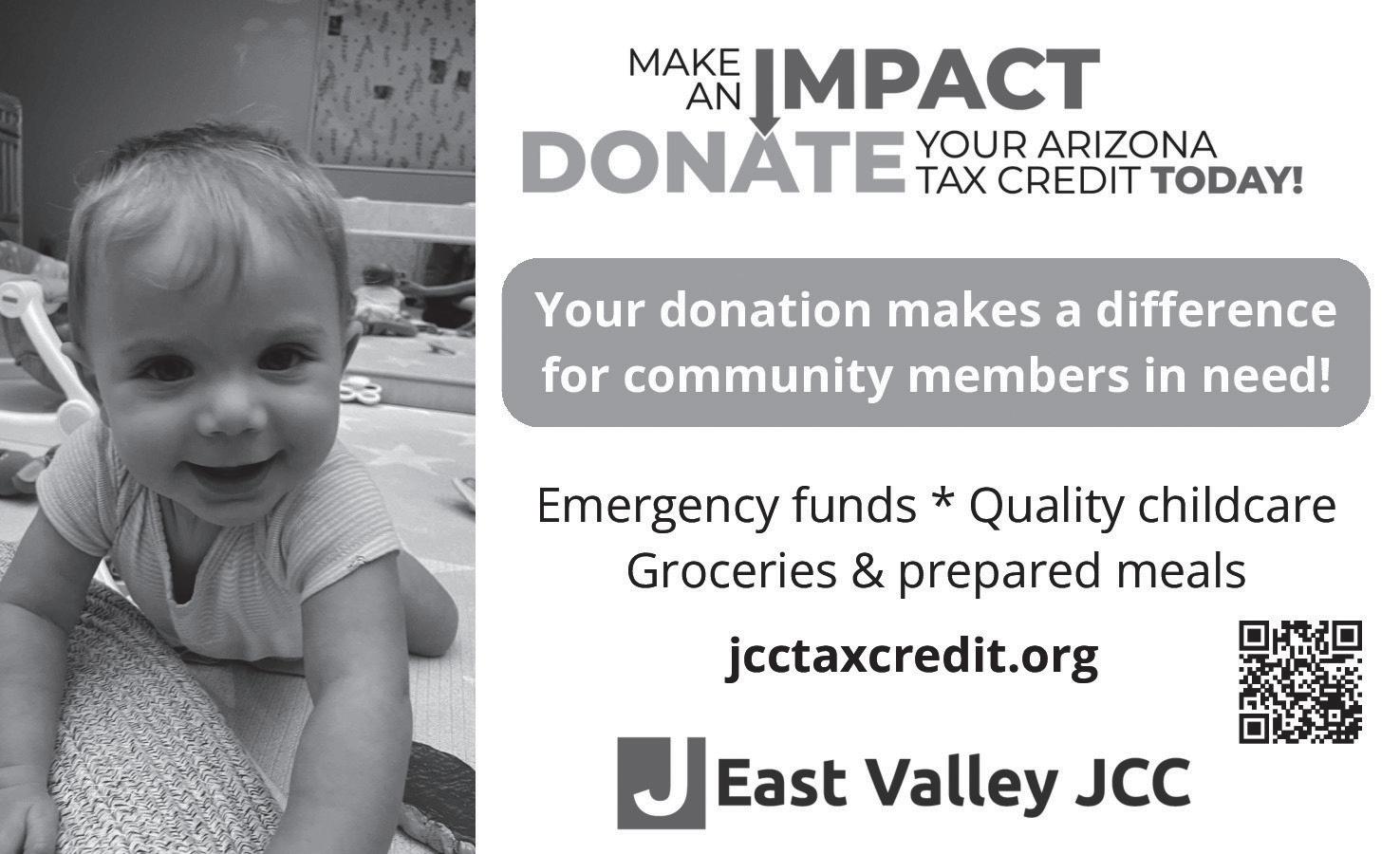
Winter 2024 + Spring 2025
The Valley of the Sun J is a place where all are welcome. We’re the place where the community comes together. To workout. To play. To grow. To engage.
The place to meet and mingle, enjoy a favorite activity, or learn a new one. We have a full calendar of events for kids, teens, adults, seniors, couples, and families.
Discover The J. There’s always something going on.
HEBREW CHOIR: YIDDISH, HEBREW + LADINO SONGS
Thursdays, 1/2, 1/9, 1/23, 1/30 | 5:30-7pm
Sing in Hebrew! Chen Holtzman, Israeli Opera Singer, will host a 4-week choir workshop featuring classical and contemporary Hebrew choir pieces.
Members: $150 | Non-Members: $200
MOSAIC ART CLASS
Wednesday AM, 1/8-2/12 | 10am-noon
Wednesday PM, 1/8-2/12 | 6-8pm
Learn techniques to design stunning pieces using colorful tiles, glass, and more.
Members: $60 | Non-Members: $72
ASU JEWISH STUDIES LECTURES
“Modern Jewish Philosophy” Three-Part Series with Hava Tirosh Samuelson
Wednesdays, 1/15, 1/22, 1/29, | 2-3pm
"Shifting Attitudes Toward Israel Among American Jews" with David N. Myers
Monday, 2/17 | 7-9pm
Join us for stimulating lectures from esteemed professors of ASU’s Jewish Studies Department.
Free for all, registration required.
2024 TAX PREP ESSENTIALS FOR FAMILIES + ALL AGES
Thursday, 1/16 | 12pm & 4pm
Join us for an informative workshop designed to help families and individuals navigate the upcoming tax season with confidence.
Free for all, registration required.
ART TALKS:
PHOENIX ART MUSEUM
Tuesdays, 1/21, 2/18, 3/18 | 11am-12pm
Join a docent from the Phoenix Art Museum and learn about artists, exhibits, and collections from the Museum.
Free for all, registration required.
SEPHARDIM ON SCREEN WITH GREATER PHOENIX JEWISH FILM FESTIVAL: LESS THAN KOSHER
Wednesday, 1/22 | 7-9:30pm

When self-proclaimed "bad Jew" Viv unexpectedly lands a job as a cantor at her family's synagogue, she embarks on a wild journey filled with illicit affairs, drug trips, tense family drama, self-discovery, and some serious Jewish bops.
Free for all, registration required.
BLUE ZONES
PROJECT SCOTTSDALE
Friday, 1/24 | 10-11am
Learn how this local organization is transforming wellness based on the central tenants of “blue zones.” Together we can make Scottsdale healthier for all!
Free for all, registration required.
TECH SAVVY SENIOR CLASS
Sundays, 2/23, 3/30, 4/27 | 11am-12pm
Attend this structured, hands-on learning experience tailored to the unique needs of older adults and technology.
Members: $18 | Non-Members: $20
CHARCUTERIE BOARD CLASS
Sunday, 2/9 | 1:30-3pm
Learn how to create a stunning, cheesefilled charcuterie board that’s perfect for any occasion! Bring your appetite and creativity—let’s make cheese the star of your next gathering.
Members: $60 | Non-Members: $75
DESERT FOOTHILLS LAND TRUST PRESENTATION
Tuesday, 2/11 | 6-7:30pm
Learn how to preserve our beautiful Sonoran Desert from engaging and knowledgeable conservationists.
Free for all, registration required.
MULTIMEDIA ART CLASS
Wednesday AM, 2/19-/26 | 10am-noon
Wednesday PM, 2/19-/26 | 6-8pm
Combine paint, collage, texture, and more to bring your artistic visions to life.
Members: $60 | Non-Members: $72

Wednesday, 1/15 | 9:30am-2:30pm
Visit Arizona’s only working olive farm and mill! Join our “Olive Oil 101” tour and learn how extra virgin olive oil is made.
Members: $62 | Non-Members: $74
Sundays, 1/26, 2/23, 3/30, 4/27 | 9-11am
Join us for “Bagels And Gabbing Every Last Sunday” to shmooze, enjoy bagels and coffee, and meet new people.
Members: Free | Non-Members: $5
Sundays Bi-Monthly, 1/26-4/6 | 3-4:30pm
Connect with other dads and focus on health, bonding, and balancing family life. Enjoy group workouts, discussions, and support in a friendly, welcoming environment.
Members: Free | Non-Members: $18
Wednesday, 2/12 | 11:30am-2:30pm
Experience English high tea at the English Rose Tea Room in the heart of Carefree, AZ. Includes a fabulous presentation of food, tea, and round-trip transportation from The J. Members: $62 | Non-Members: $74



BEGINNER BRIDGE
Mondays, 1/6-2/10 | 10am-12pm
Learn to play bridge and exercise your mind in this beginner’s class. You will master hand play and proper bidding techniques.
Members: $150 | Non-Members: $200
INTERMEDIATE BRIDGE
Mondays, 1/6-2/10 | 12:30-2:30pm
Once you have mastered the basics of bridge, elevate your skills with competitive bidding strategies and defense techniques.
Members: $150 | Non-Members: $200
BEGINNER CANASTA
Tuesdays, 1/7-2/11 | 10am-12pm
Learn Modern American Canasta in this introductory class, covering strategies, rules, and scoring in a fun, hands-on environment.
Members: $150 | Non-Members: $200
Tuesdays, 1/7-2/11 | 1-3pm
Fine-tune your game with new strategies and special hands. Gain an edge over the competition by mastering advanced techniques.
Members: $150 | Non-Members: $200
BEGINNER MAHJONG
Wednesdays, 1/8-2/12 | 10am-12pm
Learn American Style Mahjong according to National Mahjong League Rules, suitable for beginners or those needing a refresher.
Members: $150 | Non-Members: $200
INTERMEDIATE MAHJONG
Wednesdays, 1/8-2/12 | 1-3pm
This class, for those who have completed a beginner’s course or currently play, focuses on techniques and strategies to elevate your skill and speed through weekly play.
Members: $150 | Non-Members: $200
BEGINNER CHESS
Sundays, 1/12-2/16 | 12:30-2pm
This introductory course will teach you the fundamental rules and strategies of chess in a fun and engaging environment.
Members: $150 | Non-Members: $200
INTERMEDIATE CHESS
Sundays, 1/12-2/16 | 2:30-4pm
Ready to fine-tune your chess skills? Join our intermediate chess class and sharpen your strategic thinking skills while making new friends and building community.
Members: $150 | Non-Members: $200
JACKBOX GAME NIGHT: SUNDAY-FUNDAY!
Sundays, 1/19, 2/16, 3/16 | 4-5:30pm
Bring your “A-game” to this new, fun Jackbox Party Game Night! Bring your phone or device and let’s have some fun.
Members: $20 | Non-Members: $25



PLEASE NOTE: All program information is subject to change.







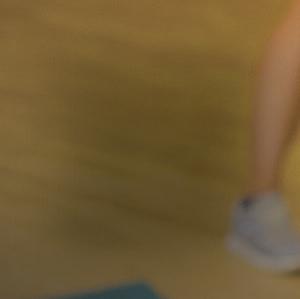


ALISON HENDELES EARLY CHILDHOOD CENTER 2025 -26 SCHOOL YEAR REGISTRATION
Starting Monday, 1/20
Register online for our Alison Hendeles Early Childhood Center 2025-26 School Year. All Early Childhood ages are welcome (6 weeks to Pre-K)!
Prices vary, please check online.
ALISON HENDELES EARLY
CHILDHOOD CENTER CAMP KOCHAVIM SUMMER 2025 REGISTRATION
Starting Monday, 2/3
Register online for our Alison Hendeles Early Childhood Center’s Camp Kochavim Summer 2025 season. All Early Childhood ages are welcome (6 weeks to Pre-K)!
Prices vary, please check online.
TOT SHABBAT HOP
Friday, 3/7 | 9:30am
Families with littles aged 0-5 are invited to join the Alison Hendeles Early Childhood Center’s Shabbat Celebration!
Free for members, registration required. In partnership with the Bureau of Jewish Education
KIDS NIGHT OUT: AMAZING RACE
Saturday, 1/25 | 5-8pm
Send your Pre-K-6th grade children to The J for a night of fun while you enjoy a fun evening out!
Members: $35 for 1 child, $25 for additional child(ren) | Non-Members: $50 per child
Sponsored by Affiliated Pediatric Dentistry
SHEMESH DAY CAMP + NEW SPECIALTY CAMPS: EARLY REGISTRATION
Starting Monday, 2/3
Register for Shemesh Day Camp and/or our new specialty camps and save when you sign up in February or March! We have camp options for a variety of interests and passions.
Prices vary, please check online.
SHABBAT FAMILY DINNER: SHEMESH DAY CAMP REUNION
Friday, 2/7 | 5-6pm
Join us for family Shabbat dinner and games whether you are or aren’t Shemesh Day Camp Family!
Members: $13
Sponsored by the Flader Family Fund
KIDS NIGHT OUT: IMAGINATION CREATION
Saturday, 3/22 | 5-8pm
Send your Pre-K-6th grade children to The J for a night of fun while you enjoy a fun evening out!
Members: $35 for 1 child, $25 for additional child(ren) | Non-Members: $50 per child
Sponsored by Affiliated Pediatric Dentistry
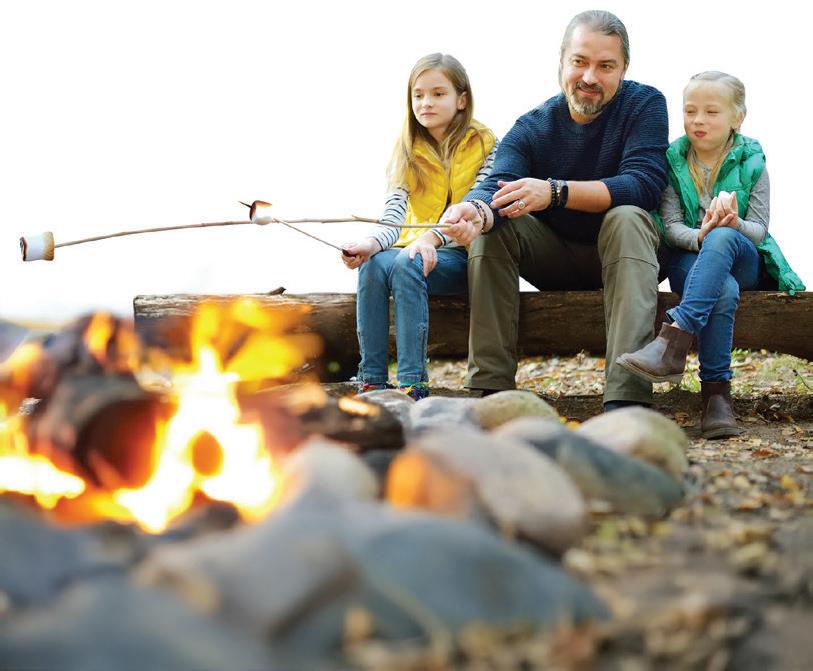
J FAMILY CAMP
Friday, 3/28 – Sunday, 3/30
Join our Valley of the Sun J Family Camp for a weekend of Shabbat and family time in beautiful Prescott, AZ at Camp Friendly Pines!
Members: $150/person | Non-Members: $180/person

Sunday, 1/5 | 1-2pm
Start the New Year on the right foot at our New Years’ Line Dancing class party. Dance to country, modern, and traditional music! Line dancing does not require a partner or prior training.
Free for members, registration required.
2/1-2/28
Celebrate Heart Health Month this February with our Cardio Challenge. Members can log their weekly workout minutes and be entered to win fabulous prizes!
Free for members, registration required.
JEFF BERKOWITZ YOUTH BASKETBALL LEAGUE
Sundays, 1/5-3/9
Kids will learn the fundamentals of basketball while instilling the core values of respect, perseverance, integrity, and community. This league is open to Pre-K –6th grades.
Members: $140 | Non-Members: $190
Sponsored by Weiss Brown
Wednesdays, 1/8-2/26 & 3/26-5/21
Open to volleyball players ages 9-15. A beginner and advanced level will build, develop, and cultivate individual skills and team play.
Members: $200 | Non-Members: $240
Sponsored by Body Systems
Friday, 2/7 | 2pm-close Saturday, 2/8 | 10am-3pm Sunday, 2/9 | 10am-3pm
Enjoy the JSC and JFORCE Invitational Swim Meet with a Superbowl theme.
Saturday, 2/8 | 11:30am-12:30pm
Calling all Swifties! Get ready to shake it off and spin to the rhythm of your favorite Taylor Swift hits. Are you ready for it?!
Free for members, registration required.

February 15-16 & March 1-2 | 7am-6pm
Completion of this course provides participants with American Red Cross Lifeguard Certification providing the knowledge and skills to prevent, recognize and respond to aquatic emergencies.
Swimming prerequisites required.
Members + Non-Members: $300
Thursday, 3/20
10am-12pm | Doors open at 9:15am
The 11th Annual Parkinson’s Wellness Day at The J features dynamic speakers, tips for staying healthy with Parkinson’s, as well as exercise segments presented by our instructors.
Free for all, registration required.
Sponsored by the Harold and Jean Grossman Parkinson’s Program at The J
VALLEY LEGENDS BEGINNER PICKLEBALL: AGES 55+
Mondays, 2/17-4/7
This beginner level adult Pickleball league allows those 55+ the opportunity to play the sport they love while building connections within the community. Round-robin style matches with scheduling and rotations provided at the start of the season.
Members: $100 | Non-Members: $125
VALLEY LEGENDS ADVANCED PICKLEBALL: AGES 55+
Mondays, 2/17-4/7
This advanced level adult Pickleball league is for players 55+ with a DUPR rating of 2.5 or higher. Round-robin style matches with scheduling and rotations provided at the start of the season.
Members: $100 | Non-Members: $125
Sundays, 3/30-6/8
Players in grades 1-9 will master the fundamentals of pickleball through exciting games and drills in a competitive yet friendly atmosphere!
Members: $150 | Non-Members: $175




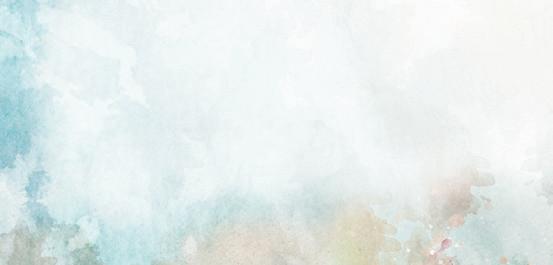
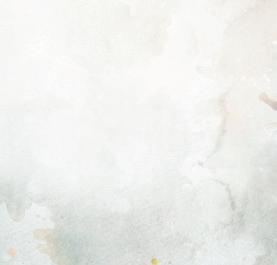
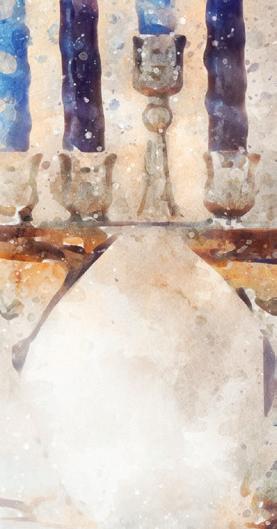


Latkes are essential to Chanukah and this is a great recipe that keeps tradition alive while also adding a twist. These flavorful latkes are high in protein and low in sugar. Add a dollop of cream cheese and enjoy!
Ingredients
• 2 medium russet potatoes, peeled
• ½ medium white onion
• 1 egg
• Sea salt and black pepper, to taste
• 3 tablespoons extra virgin olive oil
• 7 1/16 ounces smoked salmon, sliced
• 1/3 cup regular cream cheese
• ¼ cup red onion, thinly sliced
• 3 tablespoons capers
• ½ lemon, juiced
• 2 tablespoons fresh dill
Instructions
In a medium bowl, grate the potatoes and onion. Transfer to a clean kitchen towel of a piece of cheesecloth. Squeeze as much liquid as possible from the grated vegetables.
Transfer to another bowl and add the egg, salt and pepper. Mix well until combined.
Heat the oil in a large pan over medium heat. In batches, carefully drop 2 tablespoons of the potato mixture into the oil for each latke, pressing to flatten. Cook until crisp and golden, about 4 minutes per side.

salmon latkes











Notes:
Refrigerate leftovers in an airtight container for up to two days.
For more flavor, top with avocado and/ or cucumber.
For a dairy-free recipe, substitute the regular cream cheese for dairy free. JN
Tav Gross is a registered dietitian nutritionist located in Scottsdale. She specializes working with Jewish women about anti-inflammatory nutrition and overall wellness. For more information, visit nourishneshama.com.
Drain on paper towel. Top each latke with smoked salmon, cream cheese, red onion and capers. Squeeze the lemon juice on top and garnish with dill.







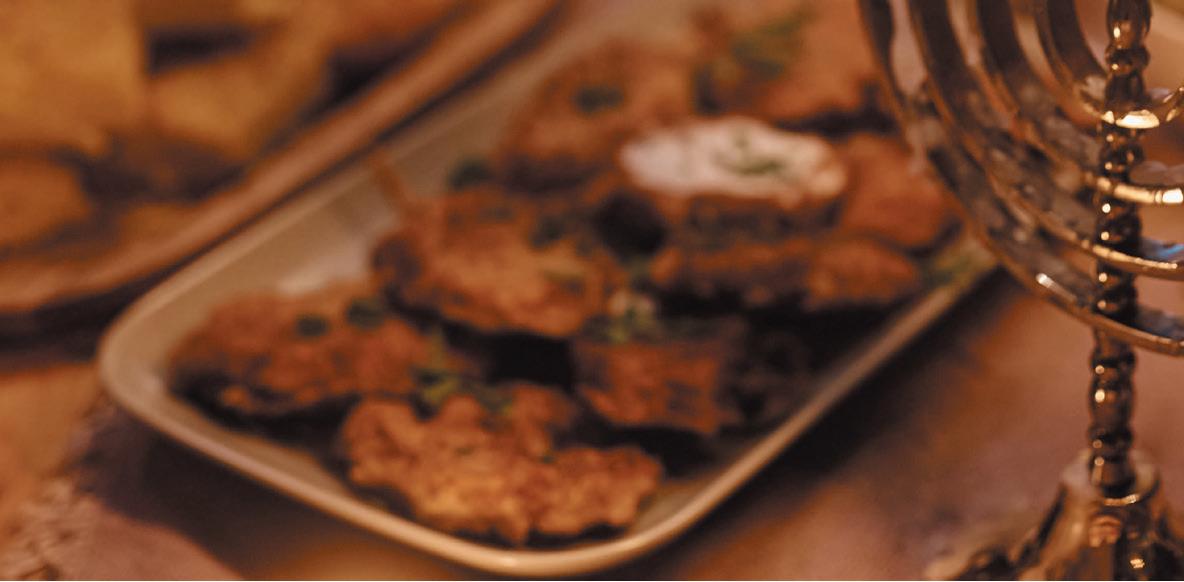



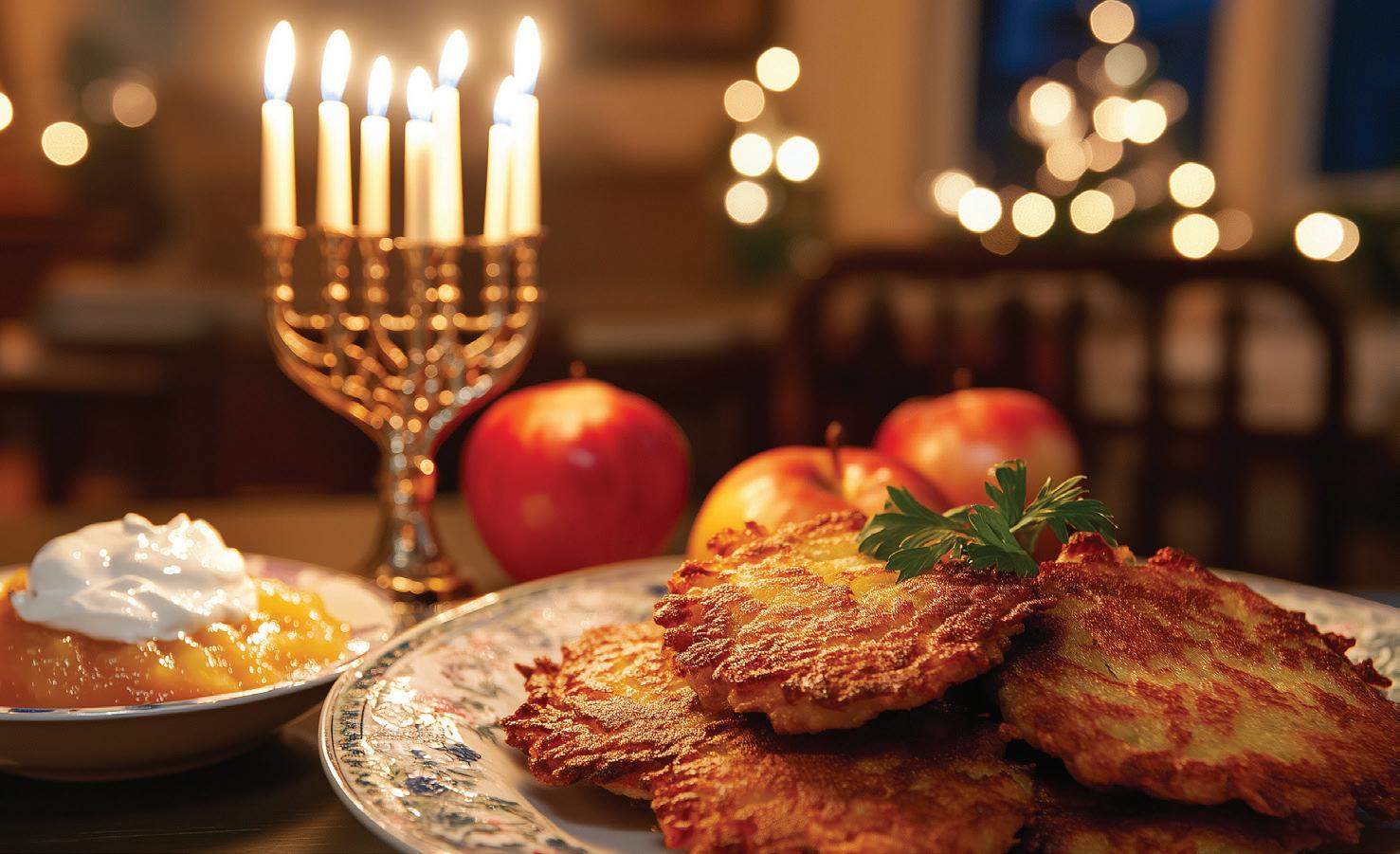
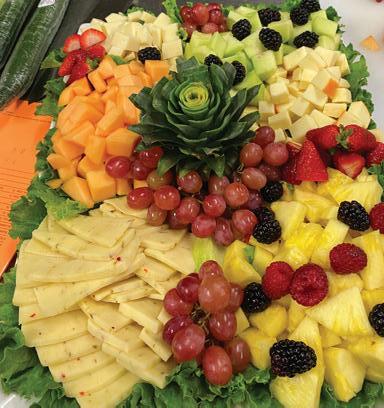






JOANNA NISSIM | THE NOSHER
The thing that I love about Jewish food is that across our wonderful and diverse communities, we often eat pretty much the same dishes, with slight variations in name, flavor and technique. For example, the typical Iraqi Chanukah sweet zalabia — a delicious fried, yeasted funnel cake soaked in a sticky and intensely sweet syrup — is essentially the same as Syrian zalabiah (although theirs is a different shape) and Indian jalebi, both also eaten on Chanukah.
This makes perfect sense, as Jews who originated from Spain spread across the world after the Inquisition, taking their recipes with them across the Middle East. There are documented recipes for zalabia in a 10th-century Arabic cookbook, which was originally made by pouring the batter through a coconut shell. The recipes were slightly adapted according to their new surroundings, including zalabia. Indian Jews, for instance, use ghee and turmeric, two very common ingredients in Indian cooking; Syrian Jews use orange blossom
Ingredients
For the batter:
• 2 teaspoons dried yeast
• 2 cups warm water, divided
• 1 teaspoon sugar
• 1 pinch salt
• 2 cups plain flour
• neutral oil, enough oil to fill a pan, 4-5 inches deep
For the syrup:
• 3 cups sugar
• 1 cup water
• 1 teaspoon lemon juice
Instructions
1. Start by making the batter. Mix the yeast, 1 cup warm water, sugar and salt, and leave for 15 minutes until it foams on top.
2. Add 2 cups flour and the remaining 1 cup water to the yeast mixture and mix well.
3. Leave in a warm place for 2 hours until the mixture is bubbling and smells yeasty.
water as the main flavor of their syrup for similar reasons.
Our family makes Iraqi zalabia, and very little has changed through the ages. I love the nostalgia that Chanukah holds for so many of us; the memories of watching parents and grandparents frying treats — be they zalabia, sfenj, latkes or any of the other delicacies Jews enjoy at this time of year — waiting for the chance to taste them.
This year, my 5-year-old son stands next to me as I fry the zalabia — he is responsible for dunking them into the syrup, licking his sugary fingers as he goes, I’m sure, and admiring his handy work at the end.
In these troubled times, it brings me reassurance to think of the culinary traditions that have stood the test of time, through wars and atrocities. I am comforted that, like the Chanukah story itself, we will come out the other side victorious — perhaps with a new festival or culinary traditions to celebrate the time in 2023 when Hamas attempted, and failed, to slay the Jewish people.
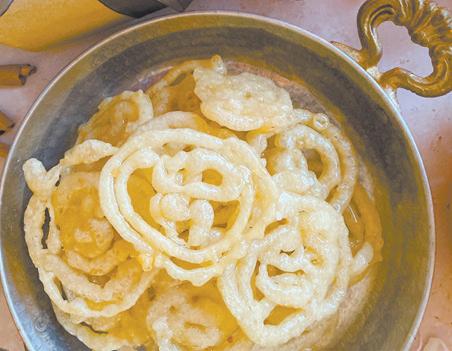
6. Heat the oil until it is shimmering. Once it shimmers, squeeze the mixture from the squeezy bottle into the hot oil creating a spiral shape, approximately 3 inches wide. Do not overcrowd the pan while frying, as the zalabia will turn soggy.



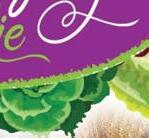





4. Whilst the mixture is fermenting, make the syrup: Mix the sugar and water together in a pan and bring to the boil.
Once boiled, let it simmer until it thickens for approximately 7-8 minutes and coats the back of a spoon. Turn it off the heat and let it cool down while you finish the zalabia.
5. Once the zalabia batter is ready and has bubbled, using a kitchen funnel, pour the mixture into a squeezy bottle with nozzle top.
7. Once the zalabia puff up and slightly change colour, flip them over. Cook for another few minutes, when they begin to firm up and become slightly golden. Remove from the pan and drain on kitchen paper.
8. While still warm, take each zalabia and drop into the warm syrup quickly, but ensuring the fritter is completely coated. Remove with a fork, shaking off the excess syrup. Serve warm or at room temperature.
Notes:
You will need: a kitchen funnel and a squeezy bottle with a nozzle top. JN
JOANNA NISSIM | THE NOSHER
Chanukah has always been my favorite Jewish holiday. I love all of it: Friends and family gathering together, watching children open their presents, cheery songs to sing when lighting the candles, the celebration of triumph over evil and the opportunity to eat fried food and happily justify it. Of course, no Jewish holiday is complete without each family’s edible traditions.
Our family are Bagdadi Jews from Bombay and Calcutta, and have wonderful culinary traditions from Iraq and India for every Jewish holiday. For example, cheese sambusak are always served to break the Yom Kippur fast, and leek fritters are always served at our Rosh Hashanah seder. On Chanukah, we enjoy all sorts of delicious fried food, from latkes and donuts to zalabia; however, I am always on the lookout for something new to add to our repertoire.
My Aunty Ruby who grew up in Calcutta, India recalls being taken as a child by her parents to KC Dass, a sweet shop close to where they lived, after Passover to have gulab jamun: a small,
milky donut which has been deep-fried and soaked in cardamom and saffron syrup. She said they would dream about the little creamy treats all Passover, and would count down the minutes until they could eat them.
This got me thinking that they would make an amazing addition to our Chanukah table: They’re fried, to symbolize the oil lasting eight days; they contain dairy, to celebrate the heroism of Judith, slayer of the general Holofernes; and they’re soaked in syrup — well there doesn’t need to be a reason to eat anything soaked in syrup!
Gulab jamun is one of India’s most famous deserts, though it was introduced by the Persians around 500 BC.
The word “gulab” is derived from the Persian words “gol” (flower) and “ab” (water), which refer to the sweet’s rose water-scented syrup. Interestingly, gulab jamun is commonly served at Diwali, the Indian festival of lights, which, much like our own festival of lights, Haunkkah, celebrates bringing light into the world and good triumphing over evil.


Ingredients
For the syrup:
• 4 green cardamom pods, bashed in a pestle and mortar
• 500 grams caster sugar
• 2 teaspoons rosewater
• ¼ teaspoon saffron strands
For the gulab jamun:
• 1 teaspoon ground cardamom
• 1 teaspoon caster sugar
• 100 grams milk powder
• 40 ggrams plain flour
• ½ teaspoon baking powder
• 50 grams softened unsalted butter, cut into cubes
Instructions
1. Make the syrup by gently heating the sugar and cardamom in 500 milleters water in a saucepan. Once it comes to a boil, lower the temperature and simmer for 10 minutes. Remove from heat, add the rosewater and a pinch of saffron, and leave to infuse. Set aside.
2. To make the gulab jamun, sieve ground cardamom, sugar, milk powder, flour and baking powder into a mixing bowl.
3. Rub in the 50 grams butter using your fingertips until the mixture resembles coarse crumbs.
4. Add the yogurt, lemon juice and 3 tablespoons milk. Mix to form a soft dough, taking care not to overwork the mixture.
5. Oil your hands with a little sunflower oil and shape small portions of the dough into walnut-sized balls, about 3 centimeters in diameter and 20 grams each. Make sure the dumplings are smooth and have no cracks or folds.





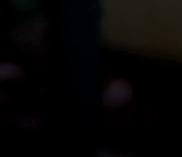





• 1 tablespoon natural yogurt
• squeeze of lemon juice
• 3 tablespoons whole milk
• sunflower oil (or any other neutral oil), for frying
To serve:
• 2 teaspoons crushed pistachios, slivered almonds and/or silver leaf
6. Reheat the syrup until it comes to the boil, then turn off the heat and cover with a lid.
7. Heat the oil in a deep saucepan. Once the top is shimmering, the oil is hot enough for frying. Test the oil with a piece of bread to ensure that it sizzles. Fry the balls in batches over medium heat for 5-7 mins. (As soon as you drop one in, move it around immediately with a spoon to ensure it doesn’t catch on the bottom of the pan.)
8. Once the balls are even and dark golden brown, remove them from the oil and let them drain on paper towel.
9. Once cooled, add to the balls warm syrup and leave to soak at room temperature for at least 2-3 hours, if not overnight.
10. Eat warm or at room temperature, and garnish with slivered almonds, crushed pistachios and/or silver leaf for a special decoration. JN



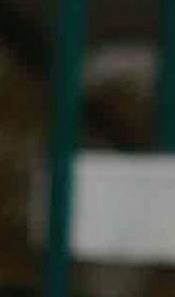
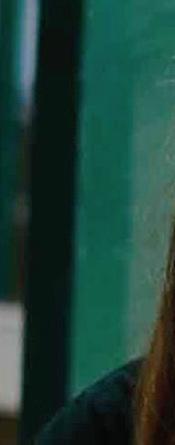








MALA BLOMQUIST | MANAGING EDITOR
With Chanukah approaching, many people are looking for thoughtful gifts for loved ones while also supporting small businesses. This year, in its annual gift guide, Jewish News decided to feature gifts created in Israel, which can be shipped across the United States. These products offer a taste of the country and provide meaningful support to the artists and small business owners in its communities.
“Israel’s small businesses have been incredibly impacted by the reduced tourism the country has seen over the last year, and many people in the U.S. are looking for ways to give back this holiday season,” said Dina Orenbach, director, Western Region at the Israel Ministry of Tourism. “While there’s nothing like finding a perfect gift while traveling, the next best thing people can do to continue showing their support is to purchase gifts from some of the many Israeli small businesses that help make Israel so special.” Below is a list of “home grown” Israeli products people can purchase this holiday season:

Yoffi sources natural, kosher, vegan-friendly treats that shoppers can buy individually or arranged in a gift box. All of the products that Yoffi sells are made locally in Israel, including fresh honey, hand-drawn olive oil, exotic teas, fresh halva and more. Gift boxes are also available for purchase that focus on a variety of themes, including tea or beauty supplies. The Shalom from Israel gift box, $64.30, offers date spread, halva spread, tahini carob, Israeli dry white wine, Israeli olive oil and a set of art postcards. For more information, visit yoffi.com.
For shoppers looking for beautiful and handmade Judaica created in Tel Aviv, Made by Dalia offers stunning Shabbat candlesticks, menorahs, hamsas and more, that are all ecofriendly and made with vegan ingredients. The Hamsa in Seashell Terrazzo for the wall, is created with real seashells collected from Israeli beaches, and Jesmonite (eco-friendly resin), $200. For more information, visit shopmadebydalia.com.












Jewelry is always a crowd-pleaser when it comes to buying holiday gifts, and Israeli designers are known for making beautiful and unique creations that are exceptionally crafted. MountEphraim is a jewelry company that handmakes their products, like this pomegranateshaped necklace, $110, out of ethically sourced wood from Israeli trees. For more information, visit etsy.com/ shop/mountephraim.





For any woman who has dealt with a disorganized purse, Israeli Tracy Lipman creates purses, wallets and aprons thoughtfully designed so that you don’t have to work hard to find what you need. The only problem is picking from the vast array of fabric choices like the small crossbody bag featuring Laurel Burch fabric for the dog lover, $60. For more information, visit traceylipman.com.


Israel may not be the first place people think of when they’re looking to buy spirits, but with the many award-winning options coming out of Israel, they’ll be wondering why they hadn’t considered it before. Those looking for the perfect gift to give this holiday season should look no further than an artisanal bottle of liquor. Only about three years old, Thinkers Distillery sells their smallbatch gins, vodkas and bourbons at 60 Total Wine & More and 80 fine wine and liquor stores across the United States. The Thinkers Furthered Dew of B’dolah Bourbon, $99.99 (Total Wine), is made from kosher food grain. For more information, visit thinkersdistillery.com.

Barbara Shaw Gifts offers curated products made locally in Jerusalem. From holidayfocused creations for Chanukah and Rosh Hashanah, to bar and bat mitzvah gifts and kitchen gear, like the Seven Species of Israel Chanan Mazal Placements, $19 (set of two), Barbara Shaw Gifts has handcrafted presents available for every person on your list. For more information, visit barbarashawgifts.com. JN


















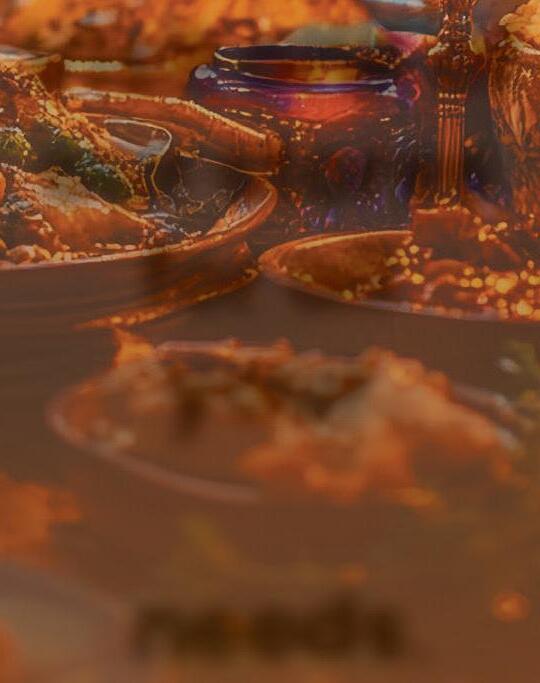


















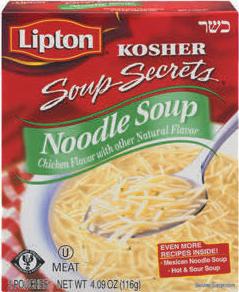














We were supposed to have a Christmas baby. Instead, we got a Chanukah miracle.
BEN SHRAGGE | KVELLER
There’s nothing wrong with being born on Christmas. Many noteworthy individuals have a December 24th or 25th birthday. Not, of course, Jesus, whose birthday is never mentioned in the Gospels. His big day was chosen by the Romans centuries after his death, likely to supplant pagan holidays that fell at the same time. But regardless of murky origin stories, the list of legitimate Christmas babies includes the scientist Isaac Newton, film star Humphrey Bogart and metal singer Lammy Kilmister. All legends in their fields
Still, when our daughter was given a December 24 due date, my wife and I had some reservations. A winter birthday in New England is dreary enough already. But a Christmas birthday risks becoming an afterthought. Friends wouldn’t be around for parties. Birthday balloons would be eclipsed by Christmas lights. Nativity scenes would remind our daughter that, for much of the world, someone else’s birth was more important. No matter how special your parents say you are, it’s hard to compete with being called the son of God.
Then again, there were pros to her having a Christmas birthday. The date would be easy to remember. She’d always get a holiday from school or work. The Jewish obstetrician would be available for the delivery. And, as Jews ourselves, we’d finally have a reason to celebrate on Christmas. For us, too, Yuletide would now be a season of gift giving, good cheer and hymns to a momentous birth. (Though admittedly, the “Happy Birthday” song lacks the gravitas of “Silent Night.”) Maybe we’d even crack some eggnog in the hospital to celebrate. What to do on Christmas is a paradoxically Jewish question. (For Christians,

CELEBRATE CHRISTMAS IN AMERICA NOW, THE JEWISH RELATIONSHIP WITH THE HOLIDAY REMAINS FRAUGHT.
even nominal ones, it’s not a question: you celebrate.) Historically, Christmas was a dark period for European Jews, who faced the perennial accusation of killing Jesus. To avoid being attacked, the traditional advice (and sometimes the law) was to stay indoors. For an embattled minority in Christian-dominant countries, Christmas was a time to be wary, not to be merry. So while even many non-Christians celebrate Christmas in America now, the Jewish relationship with the holiday remains fraught.
Today, thankfully, some less somber Jewish Christmas traditions than hiding out in fear have developed. Members of Chabad hold night-long chess tournaments on Christmas Eve. Other Jews go

out for Chinese food and see a movie on Christmas Day. And some Jews, especially those with non-Jewish partners, do celebrate Christmas, perhaps adding a Star of David ornament to their tree. Now, it seemed, my household would have a Jewish Christmas tradition to call our own. We wouldn’t be getting a tree, but there would be presents under the mezuzah on Christmas Eve.
However, as it turned out, our Jewish Christmas birthday celebration wasn’t meant to be. My wife went into labor three weeks before her due date, which in 2021 meant day seven of Chanukah. (Or, to be more precise, the middle of the night on day seven.) After over 14 hours in the delivery room, our daughter was
born on the evening of December 5, right around the time we would have been lighting the menorah for day eight. She was, we like to say, our Chanukah miracle. And since her birth took the place of lighting the candles, it only seemed right to name her Liora, which is Hebrew for “light of mine.”
It’s not as if we would have named her Holly and decked the halls if she had been born on Christmas Eve. And a Christmas birthday, I’m sure, really isn’t so bad. Still, there’s something low-key miraculous — like a jug of oil lasting eight days — about a Jewish baby due on Christmas arriving on Chanukah instead. You can call it a simple twist of fate, or you can wonder, to quote G.K. Chesterton, if “coincidences are spiritual puns.” Maybe some babies just happen to be born on one significant date instead of another. And maybe some oil just burns for an exceptionally long time. But having witnessed my daughter’s birth, I’m open to the possibility of a touch of the divine.
Although it roughly coincides with Christmas, Chanukah is a comparatively small Jewish holiday. Unlike larger Jewish festivals, there are no solemn rituals to outweigh a birthday celebration. A Yom Kippur birthday means asking for forgiveness and all-day fasting. A Passover birthday means remembering slavery and eating unleavened cake. A Chanukah birthday means one more reason to shine a light and eat oily foods. Instead of being overshadowed by a major festival, our daughter’s birthday has upgraded the status of a minor one.
In our household, at least, the revolt of the Maccabees has been joined by a new Chanukah story: the miraculous early birth of a Jewish Christmas baby. JN

This year, Chanukah begins at sundown on Wednesday, Dec. 25, 2024 and lasts until sundown on Thursday, Jan. 2, 2025. There are festivities happening around the Valley, so no matter where you live, you can find an event near you. Happy Chanukah!
FRIDAY, DEC. 20
Café Kol Ami Chanukah Celebration: 5 p.m. Temple, Kol Ami, 15030 N. 64th St., Scottsdale. Join TKA for an intergeneration Shabbat dinner followed by menorah lighting and services led by Rabbi Schneider and Cantor Noa. For more information, visit templekolami.org/calendar.
SUNDAY, DEC. 22
Israeli Dancing: The Chanukah Edition: 11:30 a.m.-2:30 p.m. Temple Beth Sholom of the East Valley, 3400 N. Dobson Road, Chandler. Join TBSEV for Israeli Chanukah dances and other popular dances. Please wear correct shoes for dancing, such as sneakers. For more information, visit tbsev.org.
WEDNESDAY, DEC. 25
Pajamas and Pancakes: 9:30-11:30 a.m. Valley of the Sun Jewish Community Center, 12701 N. Scottsdale Road, Scottsdale. Join the Valley of the Sun J for a fun kickoff to Chanukah. For more information, visit valleyofthesunj.org.
Chabad Chanukah Parade: 4 p.m. Parade line up begins at Chabad of Fountain Hills, 16830 E. Avenue of the Fountains, Fountain Hills. Join Chabad for a parade of cars from Fountain Hills to Rio Verde. For more information and to RSVP, visit jewishfountainhills.com/carparade.
WEDNESDAY, DEC. 25 AND FRIDAY DEC. 27
Hanukkah Celebrations: Temple Beth Shalom of the West Valley, 12202 N. 101st Ave., Sun City. Join TBSWV for menorah lighting at 5 p.m. on Dec. 25 and a Hanukkah Potluck Dinner on Dec. 27 at 5:30 p.m. followed by menorah lighting and Shabbat services. For more information, visit tbsaz.org.
THURSDAY, DEC. 26
Grand Chanukah Celebration: 10:30 a.m. Ina Levine Jewish Community Campus, 12701 N. Scottsdale Road, Scottsdale. Bring the whole family and join Smile on Seniors for latkes, treats and entertainment. Cost: Free; RSVP required. For more information, visit sosaz.org/chanukah.
Chanukah at the Scottsdale Quarter: 4:45 p.m. Scottsdale Quarter, 15279 N. Scottsdale Road, Scottsdale. Join Chabad of Scottsdale for menorah lighting, live music, Chanukah treats and more. For more information, visit chabadofscottsdale.org/chanukah.
Paradise Valley Chanukah Car Parade: 6 p.m. Paradise Valley Town Hall, 6401 E. Lincoln Drive, Paradise Valley. Join Chabad for a car parade followed by a Chanukah party. For more information, visit jewishparadisevalley.com.
FRIDAY, DEC. 27
Hanukkah Happy Hour: 4 p.m. Crescent Ballroom, 308 N. 2nd Ave., Phoenix. Join pianist Rick Naimark for a Hanukkah set, latkes, donuts, brisket tacos and more. Cost: Free. For more information, visit crescentphx.com/tm-attraction/ hanukkah-at-crescent-ballroom.
Featured Event
NIGHTLY, DEC. 25 THROUGH JAN. 1
Chanukah in Carefree: 5:30 p.m. Sanderson Lincoln Pavilion in the Carefree Desert Gardens, 101 Easy St., Carefree. Each evening is hosted by a different organization and many nights will feature Chanukah food like latkes and sufganiyot. Chanukah in Carefree is collecting food donations for Foothills Food Bank and there will also be a silent auction and raffle. Cost: Free. For more information, visit chanukahincarefree.com.
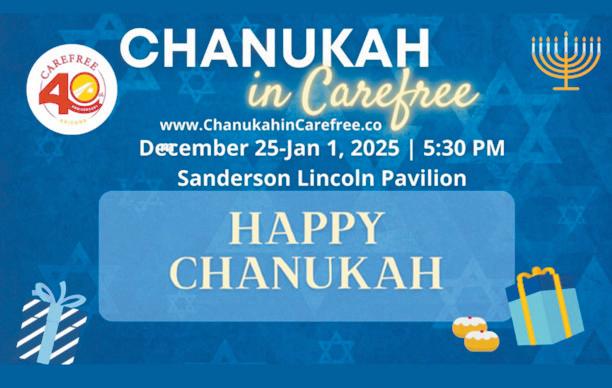
SATURDAY, DEC. 28
Beth El Hanukkah Party: 6-9 p.m. Beth El Phoenix, 1118 W. Glendale Ave., Phoenix. Join Beth El for family-friendly, all ages event and homemade latke dinner. Cost: $15 per person, $45 for family of four. For more information, visit bethelphoenix.com.
Vodka Latke: 7 p.m. Moishe House (address provided upon registration). Join Moishe House and Temple Solel Young Professionals (20s and 30s) for latkes, sufganiyot, activities, cocktails and more. For more information, visit templesolelaz.shulcloud.com/ event/vodka-latke-with-the-temple-solelyoung-professionals.
Hanukah Coffee House: 7:30 p.m. The New Shul, 7825 E. Paradise Lane, Scottsdale. Join The New Shul for an evening of live music, latkes and refreshments. Cost: $5 per person at the door, children under 13 free. For more information, visit thenewshul.org.
SUNDAY, DEC. 29
Chanukah on Ice: 1-3 p.m. Fairmont Scottsdale Princess, 7575 E. Princess Drive, Scottsdale. Chabad’s CTeen Phoenix has rented out the ice rink at the resort. Enjoy skating, an ice-sculpted menorah, gelt and games. $10 per person, $50 per family. For more information, visit cteenphoenix.com/ events/ice.
Light Up the East Valley: A Chanukah Celebration: 3 p.m. Superstition Springs Mall Outdoor Amphitheater, 6555 E. Southern Ave., Mesa. Join Chabad Jewish Center of Mesa, Gold Canyon and Apache Junction for menorah lighting and more. Cost: Free. For more information, visit chabadmesa.com.
The Great Surprise Chanukah Festival: 3:30-6 p.m. City Hall Plaza, 16000 N. Civic Center Plaza, Surprise. Join Chabad for a Chanukah celebration with activities, shows, food, menorah lighting and more. For more information, visit jewishsurprise.com.
Chanukah on the Lawn: 4 p.m. Biltmore Fashion Park, 2502 E. Camelback Road, Phoenix. Join Chabad of Phoenix for menorah lighting, Chanukah treats, music, crafts and raffles. Cost: Free. For more information, visit chabadaz.com/lawn.
Chanukah Celebration: 4:30 p.m. Chabad of Fountain Hills, 16830 E. Avenue of the Fountains, Fountain Hills. Join Chabad for a 12-foot menorah lighting, live music, latkes, doughnuts, crafts and more. Cost: Free. For more information, visit jewishfountainhills. com.
Chanukah Latke Feast: 4:30 p.m. Beth Emeth Congregation, 13702 W. Meeker Blvd., Sun City West. Join Beth Emeth for dinner, candle lighting, dessert and fun. Cost: $25 per person, register by Dec. 24. For more information, visit bethemethaz.org.
Chanukah Menorah Lighting: 5-6 p.m. Plaza at Mountainside, 4005 E. Chandler Blvd., Phoenix. Join Chabad of Ahwatukee for menorah lighting, live music, treats, activities and crafts. Cost: Free. For more information, visit chabadahwatukee.com.
MONDAY, DEC. 30
Chanukah Car Menorah Parade: 5:30 p.m. Parade starts at Wesley Bolin Plaza, 1700 W. Washington St., Phoenix. Join Chabad of Phoenix at the State Capitol for a menorah lighting, donuts and children’s activities. Cost: Free. For more information, visit chabadaz.com/carparade.
The J at JW Marriott: 5:30-7 p.m. JW Marriott Phoenix Desert Ridge Resort & Spa, 5350 E. Marriott Drive, Phoenix. Join the Valley of the Sun J for candle lighting and activities. For more information, visit valleyofthesunj.org.
Menorah Lighting: 5:30-7 p.m. RagsdaleMLK Park, 24 E 6th St, Tempe. Join ASU Chabad and Downtown Tempe for menorah lighting, music, kosher treats and kid’s activities. Cost: Free. For more information, visit downtowntempe.com/events/ menorah-lighting.
WEDNESDAY, JAN. 1
Hanukkah Candle Lighting: 5:30-7 p.m. Soleri Plaza, 4420 N. Scottsdale Road, Scottsdale. Join the Valley of the Sun J, PJ Library, Temple Chai and Pardes Jewish Day School for menorah lighting, donuts, crafts and songs. Cost: Free. For more information, visit scottsdazzle.com/event/ hanukkah-candle-lighting.
For an updated listing of Chanukah events and resources, visit JewishPhoenix.com.







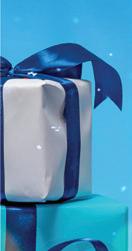




































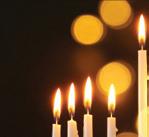
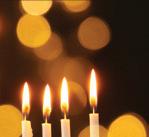






for everyday wear! Since the jewelry is clasp-less, these will stay on, until you decide to remove it. Bring loved ones to match with in-studio or book a private party at your location of choice!

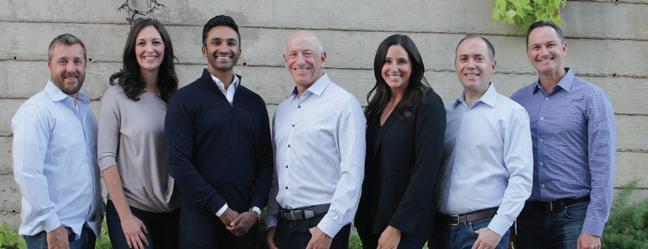


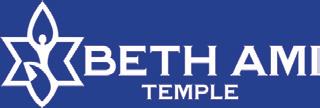





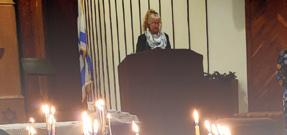






















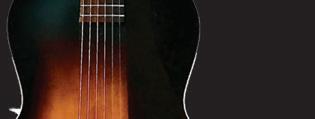










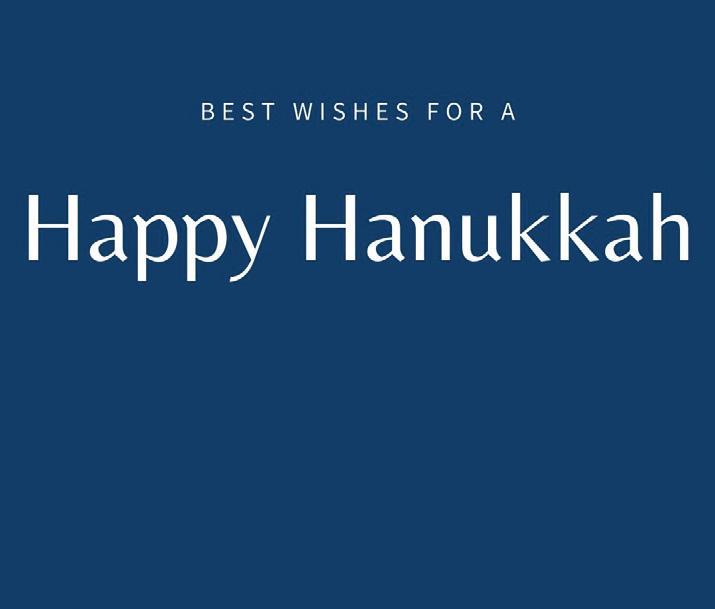





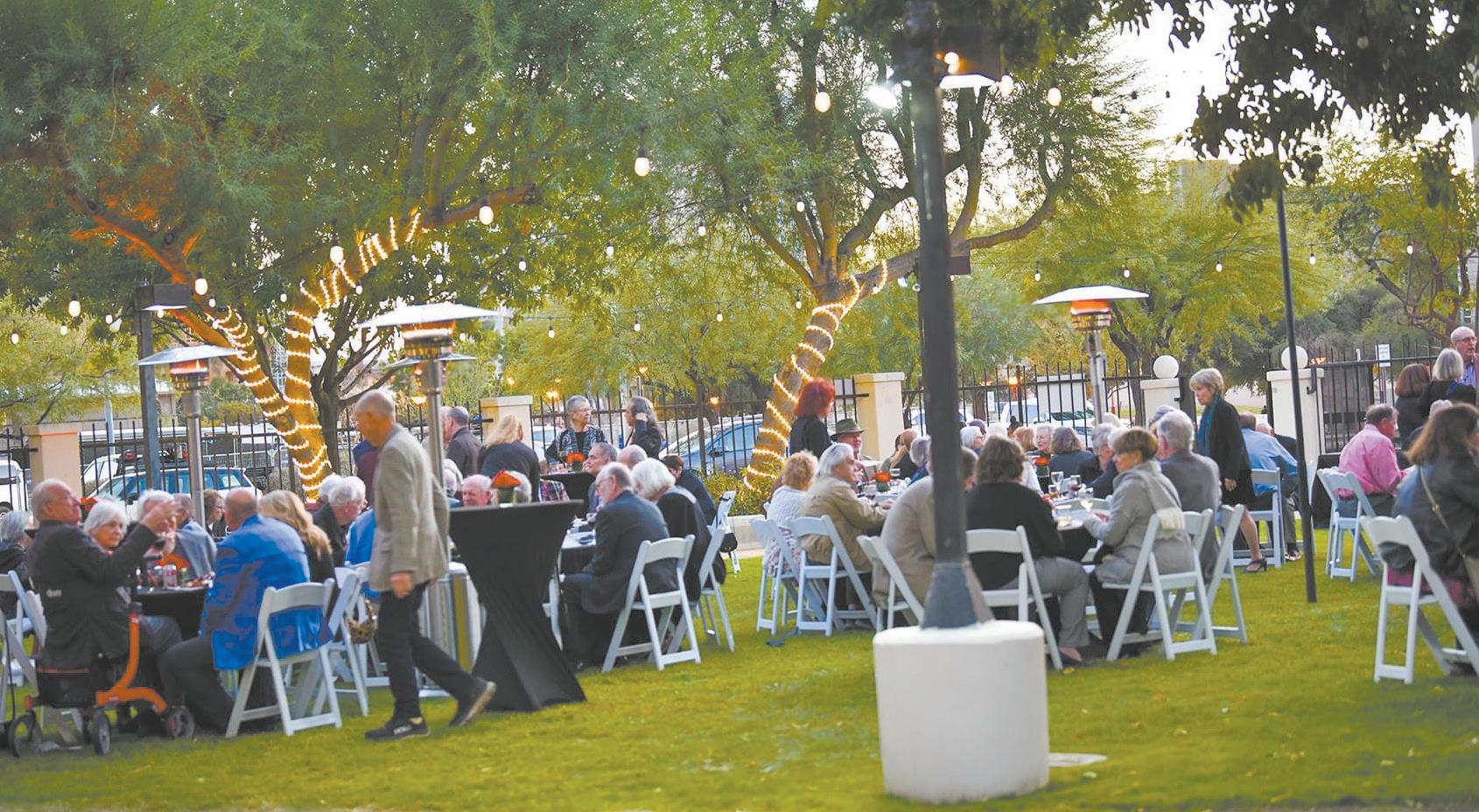
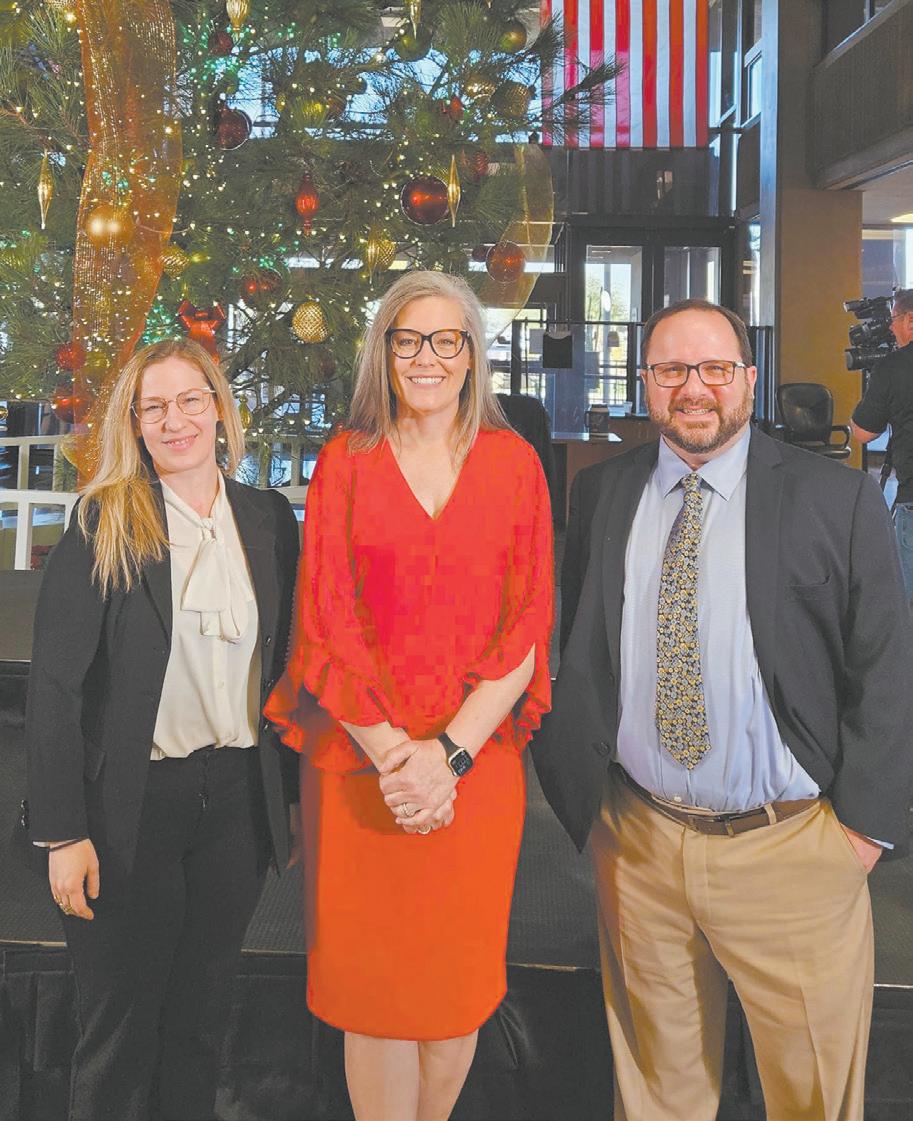
The Arizona Jewish Historical Society held a community fundraiser on Nov. 17 to replace lost revenue during construction of the Hilton Family Holocaust Education Center and maintain AZJHS’ cultural and education programs.
Denise Israel, left, and Rabbi Alicia Magal of the Jewish Community of Sedona and the Verde Valley sing "Lu Yehi," a Hebrew song that speaks of hope for peace during a commemoration service, Remembering Oct. 7, 2023, to honor those murdered in the Hamas attack on Israel last year.
veterans experiencing
them.
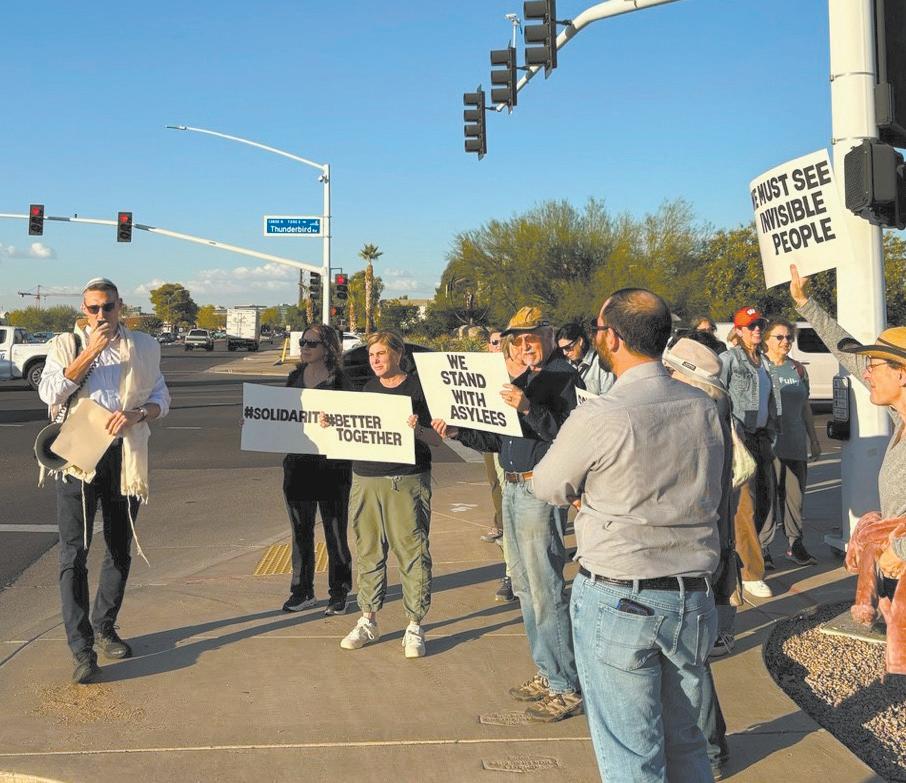
NowGen, a program of the Center for Jewish Philanthropy of Greater Phoenix that connects Jewish adults in their 20’s through 40’s in community, philanthropy and leadership, hosted another successful happy hour on Tuesday, Sept. 24, at RnR Gastropub in Scottsdale.
COURTESY OF NOWGEN
Arizona Jews for Justice led a rally in support of immigrants the first week of December. The rallygoers were joined by a group of 14 California women who came to volunteer with AJJ for a few days.
COURTESY OF RABBI DR. SHMULY
Bold, left, and Rabbi Dana Evan Kaplan at Temple Beth Shalom of the West Valley’s Western BBQ and Hoedown fundraiser on Sunday, Oct. 20.

on
Shoshana Beran, left, and Nicole Pendergast became great friends participating in the Bureau of Jewish Education of Greater Phoenix’s (BJE) single parents’ zoom every month. Here they are together at the BJE’s Rosh Hashanah event for single parents.
Temple Kol Ami Rabbi Jeremy Schneider and Cantor Noa Shaashua spoke and sang about Chanukah at the annual State of Arizona Christmas tree lighting at the Capitol with Governor Katie Hobbs, center, on Monday, Dec. 2.
Jennifer Brauner, left, celebrated the completion of the Phoenix 10K/Half-Marathon on Sunday, Nov. 10.
OF RABBI
Rachel Rabinovich, left, Life & Legacy Program director, presents Arlene Schiff, Life & Legacy senior adviser, with a thank-you gift for her past 10 years of hands-on work guiding the community through the Life & Legacy program. Arlene is retiring at the end of the year. Life & Legacy is a program of the Center for Jewish Philanthropy of Greater Phoenix.

Leah Levertov launched the Rosh Chodesh Society course to
women nurture their minds and
while enjoying delicious bites. Rosh Chodesh is celebrated on the first day of the new
Last month, the Greater Phoenix Board of Rabbis visited First Place AZ, a
calendar.
On Monday, Oct. 7, Reverend Bruce Scott, left, director of program ministries for the Friends of Israel Gospel Ministries, presented Steve Hilton with a $5,000 gift for the Building a Legacy of Hope Capital Campaign. This is the first significant gift from the interfaith community in support of the Hilton Family Holocaust Education Center, which should break ground next year.
Moms and daughters (in grades 6-10) from the Center for Jewish Philanthropy of Greater Phoenix Tikkun Olam Together service group brought donations to create Chanukah baskets for Arizona Kosher Food Pantry clients. They filled the baskets with latke mix, apple sauce, dreidels, gelt, candles, stickers, art projects and decorations, in addition to bringing and wrapping toys for children of all ages.
OF FRANK
This COMMUNITY page
This COMMUNITY page features members around the Valley and the world. Submit photos and details each
SUNDAY, JAN. 5
Oren Kessler: Terror and Resilience, Past and Present:
4:30-6 p.m. Ina Levine Jewish Community Campus, 12701 N. Scottsdale Road, Scottsdale. Join the Bureau of Jewish Education of Greater Phoenix for its Passages Series featuring a presentation by Oren Kessler on “Palestine 1936,” his book on the Great Arab Revolt of 19361939 in British-controlled interwar Palestine, revealing how Jewish-Arab relations were altered forever after. Cost: $25. For more information, visit bjephoenix.org/programs/passages.
FRIDAY THROUGH SUNDAY THROUGH DEC. 22
“Twist of the Magi:” 7:30 p.m. Friday and Saturday; 2 p.m. Sunday. Theatre Artists Studio, 12406 N. Paradise Village Parkway E., Scottsdale. Join local playwright Debra Rich Gettleman for her Jewish take on the classic “Gift of the Magi.” For more information, visit thestudiophx.org.
FRIDAY, DEC. 20
Mishpachti Tot Shabbat: 4:30-5:30 p.m. Congregation Beth Tefillah, 6529 E. Shea Blvd., Scottsdale. Join CBT for a Shabbat sing-along, live music, Kiddush and more. For more information, visit bethtefillahaz.org/events.
SUNDAY, DEC. 22
Book Discussion of Georgia Hunter’s “We Were the Lucky Ones:” 2-3:30 p.m. Private home in Scottsdale (address provided upon RSVP). Join the Phoenix Holocaust Association for a book discussion of the book that has been made into a series on Hulu. For more information, visit phxha.com/events/book-discussionof-georgia-hunters-we-were-the-lucky-ones/.
TUESDAY, DEC. 24
Mazelpalooza 2024: 9 p.m.-1 a.m. Backyard Desert Ridge, 21001 N. Tatum Blvd., Phoenix. Join NowGen for the largest gathering of Jewish young professionals (20s and 30s) in Arizona. Enjoy a night of dancing, music and celebrating with friends, old and new. Cost: $25 per person until Dec. 18; $40 from Dec. 19-24. For more information, visit phoenixcjp.my.canva. site/mazel24.
WEDNESDAY, DEC. 25
Mitzvah Day: 10 a.m. Beth El Phoenix, 1118 W. Glendale Ave., Phoenix. Join Beth El for a socialaction project and complimentary brunch. For more information, visit bethelphoenix.com/ event/mitzvahday24.
SUNDAY, DEC. 29
WLI Chag Habanot: Celebration of Daughters: 7 p.m. Online via Zoom. Join the Women’s Leadership Institute to learn about a NOrth African Sephardic tradition where women gather to light Chanukah candles. This event is open to all female-identifying individuals (WLI alumnae, non-alumnae, local community members and those who are not local). For more information, visit wliwjlc.wufoo.com/forms/kqblluf1hyqszu/.
TUESDAY, JAN. 7
Bagels & Hope Event: 5 p.m. 6501 E. Greenway Pkwy, #152, Scottsdale. Join Arizona Jews for Justice to craft travel kits filled with begel sandwiches for the unsheltered community. For more information, contact arizonajews4justice@gmail.com.
Professional Advisory Network January Gathering: 7 p.m. Location provided upon registration. Join the Center for Jewish Philanthropy’s Professional Advisotry Network for a presentation on estate planning taxes by Victoria Harris, CPA, managing partner of Hunter Hagan & Co. Cost: $18 per person. For more information, visit jewishphoenix. com/events/professional-advisory-networkjanuary-gathering-01-07-2025-2/.
THURSDAY, JAN. 9
Manuscripts Don’t Burn: 7 p.m. Arizona Jewish Historical Society, 122 E. Culver St., Phoenix. Join Red Rocks Music Festival for a presentation by Ukrainian-American concert pianist and author Inna Faliks of Manuscripts Don’t Burn, which includes readings from her best-selling memoir “Weight in the Fingertips, a Musical Odyssey from Ukraine to the World Stage.” For more information, visit redrocksmusicfestival.com.
FRIDAY, JAN. 10
University on Wheels: 9:30 a.m.-12 p.m. Embassy Suites by Hilton Phoenix Biltmore, 2630 E. Camelback Road, Phoenix. Join Brandeis National Committee Phoenix Chapter for breakfast and a presentation by Dr. Avital Rodal on the university’s new engineering program and how it will create unique opportunities for students to solve real-world challenges at the intersection of science, technology and the arts. Cost: $56 per person. For more information, visit brandeisphoenix.org.
SUNDAYS
B.A.G.E.L.S: 9-11 a.m.; last Sunday of the month. Valley of the Sun Jewish Community Center, 12701 N. Scottsdale Road, Scottsdale. Grab a bagel and a cup of coffee at Bagels And Gabbing Every Last Sunday and enjoy some time with your friends and make new ones. You must register to attend. Bagels and coffee will be provided. Cost: Free for members, $5 for guests. For more information and to register, visit vosjcc.org.
THURSDAYS
Storytime at Modern Milk: 9:30 a.m. Modern Milk, 13802 N. Scottsdale Road, #163, Scottsdale. Storytime for babies, toddlers and preschoolers. Integrates children’s books and songs while giving parents new ideas for play. Cost: $5. For more information and to register, visit modernmilk.com/after-baby.

SUNDAYS
Chassidus Class: 9 a.m. Online. Learn about the Chasidic movement with Rabbi Yossi Friedman. Use this link: ChabadAZ.com/LiveClass. Cost: Free. For more information, visit chabadaz.com.
Jewish War Veterans Post 210: 10 a.m. Online. Any active duty service member or veteran is welcome to join monthly meetings, every third Sunday. Cost: Free. For more information, email Michael Chambers at c365michael@yahoo.com.
Sundays are for the Family Weekly Feed: 3-5 p.m. Tempe Beach Park, 80 W. Rio Salado Pkwy., Tempe. Join Arizona Jews for Justice and AZ HUGS for the Houseless every Sunday to serve food to those in need. For more information and to RSVP, email Arizonajews4justice@ gmail.com.
Anxiety in the Modern World: 6 p.m. Online. Learn the secrets of the Torah for living stressfree in the current environment with Rabbi Boruch of Chabad of Oro Valley. Cost: Free. Use this link: zoom.us/j/736434666. For more information, visit chabadaz.com.
MONDAYS
Pomegranate Guild of Judaic Needlework, Desert Cactus Chapter: 10 a.m. The Oasis at Sagewood, 4555 E. Mayo Blvd., Phoenix. The guild meets the third Monday of the month, adjusted when necessary to accommodate Jewish holidays. For more information, visit pomegranateguild.org.
Mahjong: 1:30-3:30 p.m. East Valley Jewish Community Center, 908 N. Alma School Road, Chandler. Come play mahjong each week. For all levels. Cost: Free; registration required at evjcc.org/mahjong.
Ethics of Our Fathers: 7 p.m. Online. Learn with Rabbi Zalman Levertov. Use this link: bit. ly/2Y0wdgv. Cost: Free. For more information, visit chabadaz.com.
Quotable Quotes by our Sages: 7 p.m. Online. Learn with Rabbi Shlomy Levertov. Use this link: JewishParadiseValley.com/class. Cost: Free. For more information, visit chabadaz.com.
Partners in Torah: 7:30 p.m. Online. Join a growing group of inspired learners with Project Inspire. Cost: Free. Use this link: us04web.zoom. us/j/3940479736#success, password is 613. For more information, email Robin Meyerson at robin@projectinspireaz.com.
Learning to Trust in God: 7:30 p.m. Online. Learn with Rabbi Yossi Friedman. Use this link: ChabadAZ.com/LiveClass. Cost: Free. For more information, visit chabadaz.com.
Torah & Tea: 7:30 p.m. Online. Learn with Rabbi Yossie Shemtov. Cost: Free. For more information, visit Facebook.com/ChabadTucson.
Single Parent Zoom: 8 p.m. First and third Monday of every month. Join The Bureau of Jewish Education’s Family University single parents’ group for those looking to form friendships and build their support system with like-minded people. For more information or to register, visit bjephoenix.org/family-university.
TUESDAYS
Let’s Knit: 1:30 p.m. Ina Levine Jewish Community Campus, 12701 N. Scottsdale Road, Scottsdale. Share the pleasure of knitting, crocheting, etc. outside the social hall in the campus. Can’t knit? They will teach you! Every level welcome. Cost: Free. For more information, visit vosjcc.org.
Maintaining an Upbeat Attitude: 7 p.m. Online. A class exclusively for people in their 20s and 30s, learn how Jewish Mysticism can help with your attitude with Rabbi Shlomy Levertov. Use this link: JewishParadiseValley.com/YJPclass. Cost: Free. For more information, visit chabadaz.com.
Torah Studies: 7:30 p.m. Online. Learn with Rabbi Mendy Levertov. Use this link: ourjewishcenter.com/virtual. Cost: Free. For more information, visit chabadaz.com.
WEDNESDAYS
Torah Study with Temple Beth Shalom of the West Valley: 11 a.m.-12:30 p.m. Online. Weekly study group explores that week’s portion and studies different perspectives and debates the merits of various arguments. Intended for adults, Torah study is open to students of all levels. For more information, contact the TBS office at 623-977-3240.
Happiness Hour: 11:30 a.m. Online. Class taught by Rabbi Pinchas Allouche that delves into texts and references culled from our traditions to address a relevant topic. For more information or to join, visit cbtvirtualworld.com.
Lunch & Learn: 12 p.m. Online. Grab some food and learn with Rabbi Yehuda Ceitlin. Use this link: Facebook.com/ChabadTucson. Cost: Free. For more information, visit chabadtucson.com.
Torah Study with Chabad: 12 p.m. Online. Take a weekly journey of Torah with Rabbi Yossi Levertov. Cost: Free. For more information, visit chabadaz.com.
The Thirteen Petalled Rose: 1 p.m. Online. Kabbalah class that studies “The Thirteen Petalled Rose” by Rabbi Adin Even-Israel Steinsaltz, focusing on the many concepts of Kaballah and Jewish Mysticism and applying them to everyday life. For more information or to join, visit cbtvirtualworld.com.
Grief Support Group: 5-6 p.m. Online via Zoom. Therapist Susan Charney MCW, LCSW, leads a grief support group every first and third Wednesday of the month virtually for individuals experiencing the loss of an adult child or sibling. In lieu of any fees for these sessions, donations to Temple Solel are appreciated. For more information, contact susancharneycounseling@ gmail.com.
History of the Jews: 7 p.m. Online. Learn the Jewish journey from Genesis to Moshiach with Rabbi Ephraim Zimmerman. Use this link: zoom.us/j/736434666. Cost: Free. For more information, visit chabadaz.com.
JACS: 7:30-8:30 p.m. Online. Zoom support group for Jewish alcoholics, addicts and their friends and family on the first and third Wednesdays of the month. Cost: Free. For more information, email jacsarizona@gmail. com or call 602-692-1004.
THURSDAYS
Ladies Torah & Tea: 10:30 a.m. Online. Learn about the women of the Torah with Mrs. Leah Levertov. Use this link: ourjewishcenter. com/virtual. Cost: Free. For more information, visit chabadaz.com.
Talmud - Maakos: 11 a.m. Online. Learn with Rabbi Shlomy Levertov. Cost: Free. Use this link: JewishParadiseValley.com/YJPclass. For more information, visit chabadaz.com.
The Science of Everything: 11 a.m. Online. Explore the most fundamental work of Chassidut: the Tanya, with Rabbi Boruch. Use this link: zoom.us/j/736434666. Cost: Free. For more information, visit chabadaz.com.
Mindfulness Gatherings: 12 p.m. Online. Hosted by Hospice of the Valley via Zoom. Cost: Free. To join by phone, dial 1-253-2158782, meeting ID 486 920 2119#, to get the Zoom link or for further questions contact Gill Hamilton at ghamilton@hov.org or 602-748-3692.
Weekly Mahjong: 1-3 p.m. Temple Solel, 6805 E. McDonald Drive, Paradise Valley. Join Temple Solel each Thursday afternoon for mahjong. Lessons available for beginners. Cost: Free. RSVP via email to dottiebefore@gmail.com so they know how many tables to set up.
Teen Discussions: 7-8:30 p.m. Online. Learn with Rabbi Tzvi Rimler. Use this link: cteen. clickmeeting.com/east-valley. Cost: Free. For more information, visit chabadaz.com.
SATURDAYS
Saturday Mindfulness Gatherings: 9:30 a.m. Online. Hosted by Hospice of the Valley. To join by phone, dial 1-253-215-8782, meeting ID 486 920 2119#. To get the Zoom link or for more information, contact Gill Hamilton at ghamilton@hov.org or 602-748-3692.
Book Discussion: 1:30-2:30 p.m. Online. Join Or Adam Congregation for Humanistic Judaism on the third Saturday of every month for a book discussion. For more information and to register, contact oradaminfo@gmail.com.
FRIDAYS
Shabbat in the Park: 10-11 a.m. Cactus Park, 7202 E. Cactus Road, Scottsdale. Join the Bureau of Jewish Education of Greater Phoenix monthly for music, parachute play, crafts and a family Shabbat experience. For more information, visit bjephoenix.org.
Welcome Shabbat: 11-11:30 a.m. Online. Celebrate Shabbat with the JFCS Virtual Center for Senior Enrichment. Each week a different guest host will lead the program with song and celebration. Cost: Free. For more information, visit jfcsaz.org/cse.
Shabbat at Beth El: 7:15 a.m. and 5:45 p.m on Zoom; 9:30 a.m. at Beth El Phoenix, 1118 W. Glendale. Ave., Phoenix or livestreaming on YouTube. Celebrate Shabbat with songs, blessings and teachings with Rabbi Stein Kokin the first Friday of every month. Special guests will be welcoming Shabbat during the remainder of the month. For more information or to join, visit bethelphoenix.com.
Erev Shabbat Service: 5:30 p.m. Online. Rabbi Alicia Magal will lead a service livestreamed for members of the Jewish Community of Sedona and the Verde Valley. Cost: Free. For more information and to obtain the Zoom link, visit jcsvv. org/contact.
Shabbat Service: 5:30-6:30 p.m.; Oneg at 5 p.m. Temple B’rith Shalom, 2077 Brohner Way, Prescott. Join Temple B’rith Shalom for a musical and spiritual Shabbat service. For more information, visit brithshalom-az.org.
Shabbat Services: 5:30 p.m. nosh, 6:15 p.m. service; morning service has varying dates and times. Temple Chai, 4645 E. Marilyn Road, Phoenix. For more information, contact Joan Neer at jneer@templechai.com.
Shabbat Services with Sun Lakes: 5:30-6:15 p.m. Sun Lakes Chapel, 9240 E. Sun Lakes Blvd. North, Sun Lakes. Sun Lakes Jewish Congregation conducts this twilight service on Aug. 9. For more information, contact 480-612-4413.
Pre-Shabbat Kiddush Club: 6 p.m. Online. Say Kiddush with Rabbi Mendy Levertov. Cost: Free. Use this link: ourjewishcenter.com/virtual. For more information, visit chabadaz.com.
Shabbat Services: 6 p.m; 9:30 a.m. Congregation Or Tzion, 16415 N. 90th St., Scottsdale. Services are also live streamed at otaz.org/ livestream. For more information about services, events and membership, visit congregationortzion.org or call 480-342-8858.
First Friday Shabbat Services: 6:15 p.m.; Oneg at 7:15 p.m. Valley Unitarian Universalist, 6400 W. Del Rio St., Chandler. Join Congregation NefeshSoul for Friday night services the first Friday of each month in the sanctuary building of Valley Unitarian Universalist. For more information, contact Jim Hoffman at 480-329-3316.
Shabbat Services: 6:15 p.m; 10 a.m. Congregation Beth Israel, 10460 N. 56th St., Scottsdale. Services held in the Goldsmith Sanctuary. Participants must pre-register by Thursday at 5 p.m. Priority will be given to members first and then guests. If there are more requests than available seats a lottery system will be used. For more information or to make a reservation, visit cbiaz.org/shabbat-services.
Kabbalat Shabbat and/or Shabbat morning service: 6:30 p.m.; 10 a.m.; dates vary. Congregation Kehillah, 5858 E. Dynamite Blvd., Cave Creek. Join Rabbi Bonnie Sharfman and cantorial soloists Erica Erman and Scott Leader either in person or via Zoom. For safety reasons,
please register ahead of time. For dates, visit congregationkehillah.org/event/. Register by emailing info@congregationkehillah.org.
Shabbat Services: 7 p.m. Temple Beth Shalom of the West Valley, 12202 N. 101st Ave., Sun City. Services are followed by an Oneg. Services are live-streamed on YouTube. For more information and to get the YouTube link, visit tbsaz.org or call 623-977-3240.
Shabbat Services with Beth Ami Temple: 7 p.m. Unitarian Universalist Congregation of Phoenix, 4027 E. Lincoln Dr., Paradise Valley. Rabbi Alison Lawton and Cantorial Soloist Michael Robbins lead Shabbat services twice a month. For more information, visit bethamitemple.org.
Third Friday Shabbat: 7-9 p.m. Group meets at a North Scottsdale location. The Desert Foothills Jewish Community Association hosts a Shabbat service followed by a program. Contact 602-487-5718 for more information.
MONDAYS
Fitness Xpress Series with Zoe: 11-11:30 a.m. Online. Presented by JFCS Center for Senior Enrichment. Workout features weight and band exercises as well as yoga poses. Exercises will be demonstrated standing, but can also be done sitting in a chair. Cost: Free. For more information, visit jfcsaz.org/cse.
Sip & Schmooze: 11 a.m. milk + honey, 12701 N. Scottsdale Road, Scottsdale. Sip on kosher coffee or tea, enjoy a pastry and schmooze every second Monday of the month. RSVP appreciated to chani@sosaz.org or 602-492-7670. For more information, visit sosaz.org.
Featured Presentation: 12:30 p.m. Online. Join Smile on Seniors Mondays and Wednesdays to learn from a variety of presenters about topical issues, like Q&As with medical professionals, entertainers and lectures. Cost: Free. For more information, visit sosaz.org/virtual or email Rabbi Levi Levertov at levi@sosaz.org.
TUESDAYS
Movie Discussion Group: 11 a.m. Online. Join Smile on Seniors on the third Tuesday of every month hosted by Issy Lifshitz. Cost: Free. For full details and the movie of the month visit sosaz.org/virtual or email Rabbi Levi Levertov at levi@sosaz.org.
BIRTH ANNOUNCEMENT
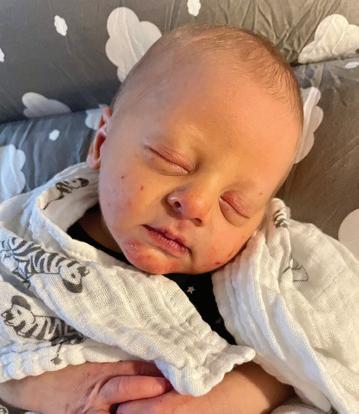
OBITUARY
WEDNESDAYS
Fitness Fun with Zoe: 10-10:45 a.m. Online. Presented by JFCS Center for Senior Enrichment. Workout features light chair exercises with optional weights. Cost: Free. For more information, visit jfcsaz.org/cse.
Chair Yoga with Zoe: 11-11:45 a.m. Online. Presented by JFCS Center for Senior Enrichment. 45-minute chair yoga class. No prior yoga experience required. Cost: Free. For more information, visit jfcsaz.org/cse.
THURSDAYS
Memory Cafe: 10-11 a.m. first Thursday; 1-2 p.m. third Thursday. Online. Presented by Jewish Family & Children’s Service. Program for those with changes in their thinking or memory, mild cognitive impairment due to Alzheimer’s disease or a related disorder, along with their care partners. For more information, visit jfcsaz.org/our-services/ older-adult-services/memory-cafe/.
In the Kitchen with Benita: 12:30 p.m. Join Smile on Seniors on the fourth Thursday of every month for some delicious cooking or baking fun! Cost: Free. For full details visit sosaz.org/virtual or email Rabbi Levi Levertov at levi@sosaz.org.
FRIDAYS
Welcome Shabbat: 11-11:30 a.m. Online. Celebrate Shabbat with the JFCS Virtual Center for Senior Enrichment. Each week a different guest host will lead the program with song and celebration. Cost: Free. For more information, visit jfcsaz.org/cse.
Sit or Stand Ballet Class: 12-12:45 p.m. Online. Presented by JFCS Center for Senior Enrichment. Jennifer Cafarella Betts and Friends from Ballet Theatre of Phoenix teach this class. Grab a chair or you can stand next to a chair or counter. Cost: Free. For more information, visit jfcsaz.org/cse.
Musical Friday: 12:30 p.m. Online. Join Smile on Seniors on the first Friday of every month for a musical presentation. Cost: Free. For full details visit sosaz.org/virtual or email Rabbi Levi Levertov at levi@sosaz.org. JN
RAFAEL BARTON LEE
Rafael Barton Lee was born on Oct. 31, 2024, at St. Joseph’s Hospital and Medical Center. He is the son of Nira Lee and David Eisenbise of Tempe.
Grandparents are Marcie Lee of Tempe and the late Rabbi Barton Lee, Hillel at ASU rabbi for 42 years. JN
Norma S. Hoffman (née Goldberg) of Paradise Valley died on Dec. 5, 2024. She was 97. Norma was born in Toronto, Canada and was affiliated with AIPAC and Jewish National Fund-USA.
Norma was preceded in death by her husband, Elliott, and brother, Nathan Goldberg. She is survived by daughters Candy Weiner (Alan) and Dara Shahon; son, Rick Hoffman; seven grandchildren and 15 great-grandchildren.
Services were held on Dec. 6, 2024, at Mt. Sinai Cemetery and officiated by Rabbi Shmuel Tiechtel.
Donations in her name made be made to Cheder Lubavitch of Arizona or Chabad at ASU. JN


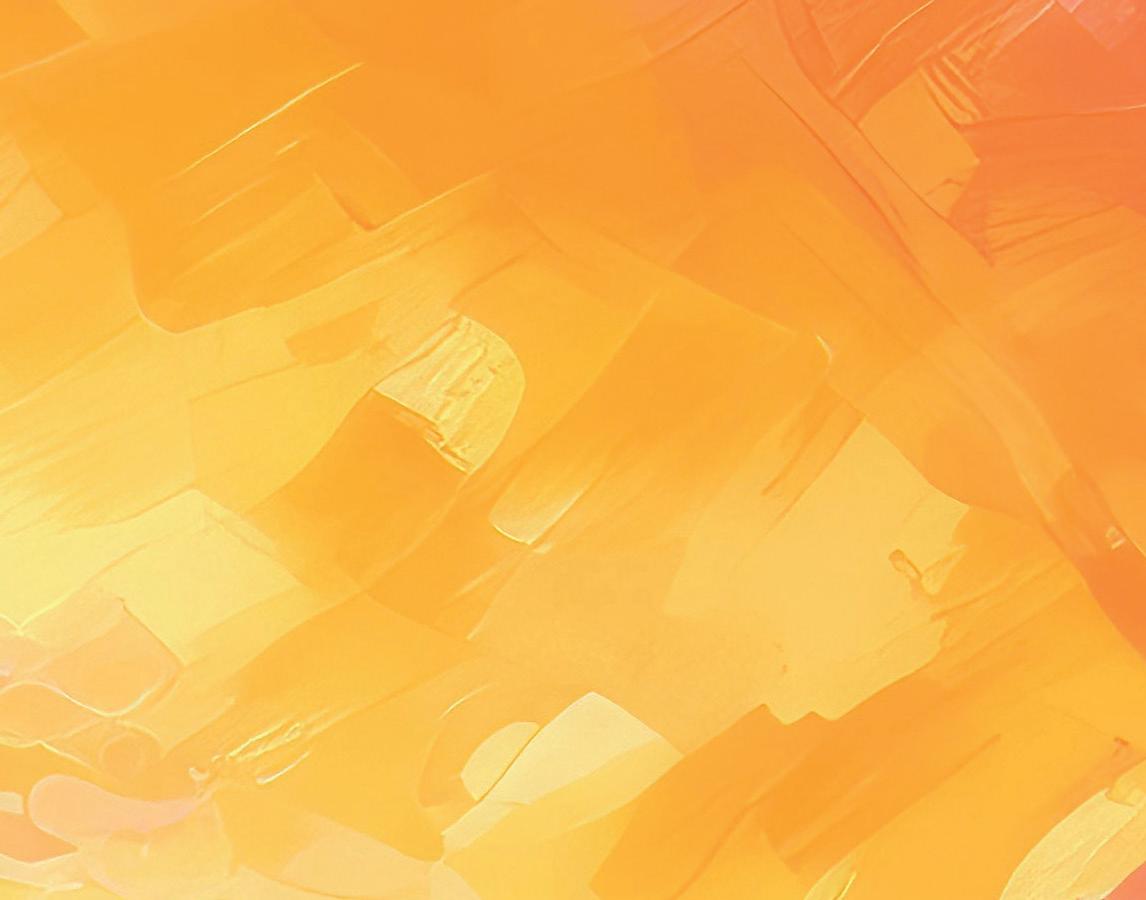

COPPER SPONSORS
Amy and Andrew Cohn
Cindy and Adam Brooks
Lauren and Zev Hendeles
Suzanne and Steve Hilton Family
Rachel and Jonathan Hoffer
Donna and Joel Kramer
Scott Seldin
Kathy and David Tinkelman
CACTUS WREN SPONSORS
Julie Bennett
Lanny and Marlene Lahr
Lane & Nach P.C.
Polly and Jonathan Levine
Howard and Ellen Lindzon
R.O.I. Properties
Joel Schaller and Sally Oscherwitz
Penny and Robert Sarver
The Zeidler Group of BAIRD Private Wealth Management
Evelyn and Leon Zeitzer
TURQUOISE SPONSORS
Affiliated Pediatric Dentistry and Orthodontics
Anonymous
Scott Cohen/Engelman Berger

Schoen Family
The Jess & Sheila Schwartz Foundation
Marcia and Joe Unell
Weiss Brown
Weiss Wealth Strategies of Raymond James
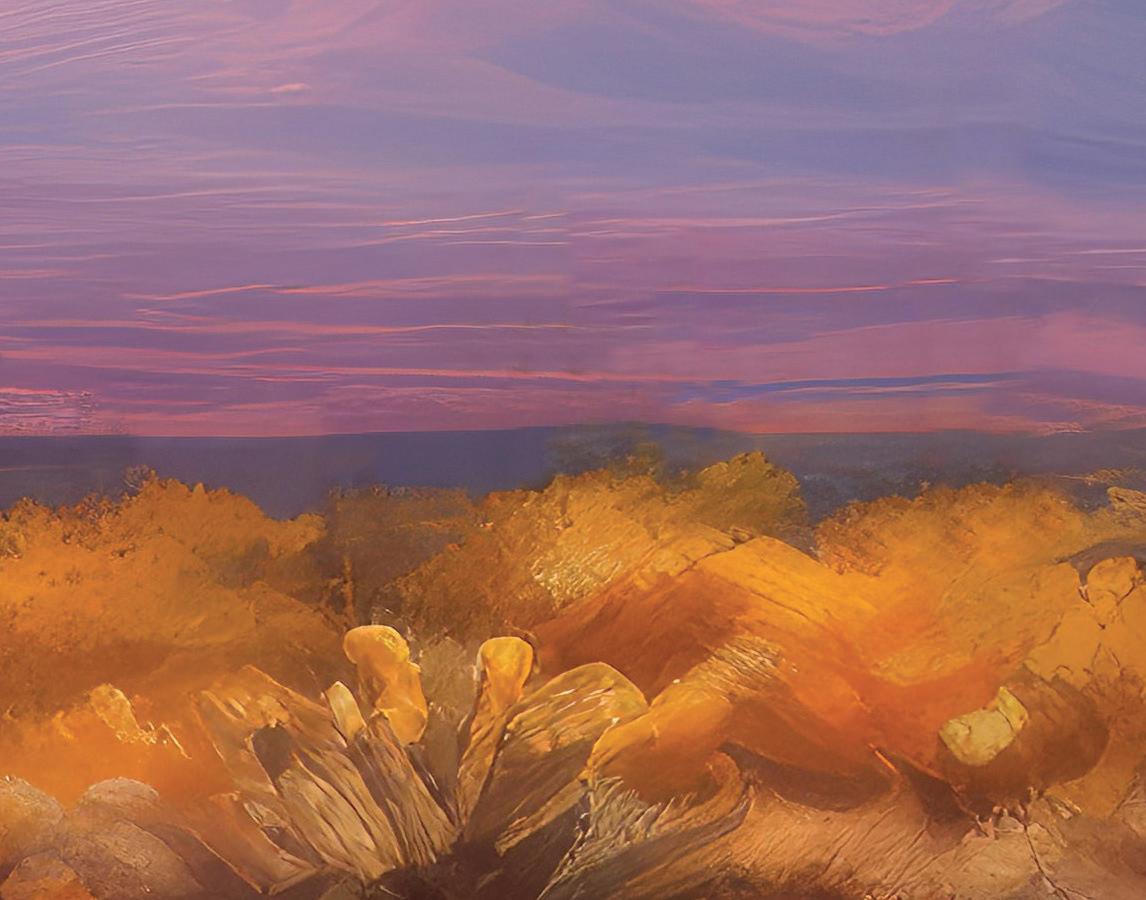
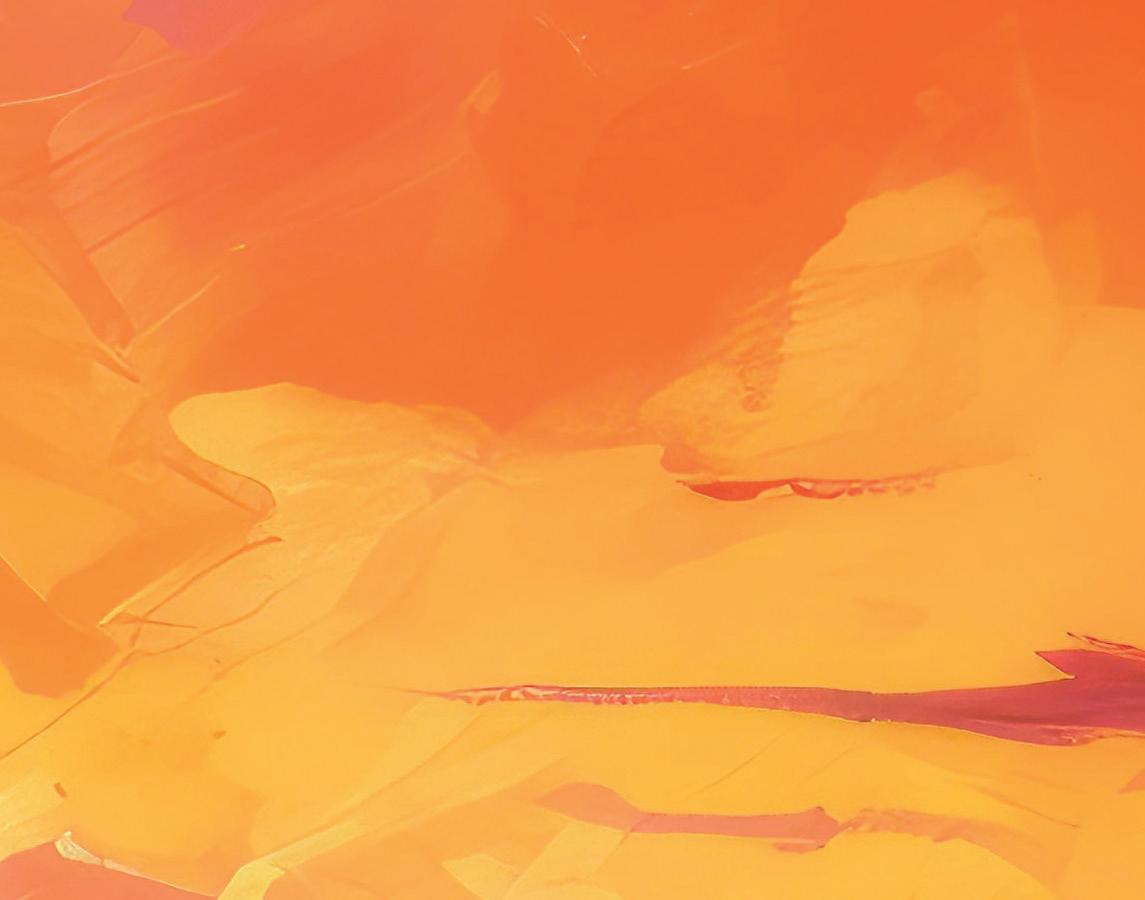
Leona, Daniel, and Kerry Goldfarb
Dottie and Murray Goodman Goodmans
Denise and Eric Kaye/ Connections In HomeCare and Communities
Laffer Tengler Investments
Gary and Julie Linhart
Kierman Law
Michelle and Bryan Kort
Aly and Mark Koslow
Steven and Jen Schwarz/ ViaWest Group
Barbara and Barry Zemel

PALO VERDE SPONSOR
Carrie and Morrie Aaron/ MCA Financial Group
Alliance Bank of Arizona
Elaine and Joel Bernick
Mark Bregman/Dyer Bregman

Lori and Barry Markson
MidFirst Bank
Edward Newman Family
Melissa Schepps/Sonny Schepps Foundation
SMS Financial
Ferrisi Wong & Carter, PLLC
Pnina Levine and Alan Gold
Neil Moffett and Vicki Etherton/ Landmark Title Assurance Agency
Michelle and David Notrica RIESTER
Susie and Bob Roth/ Cypress HomeCare Solutions
Sara and Bob Silver
Sacks Tierney P.A.
David Weiner/Weiner Insurance
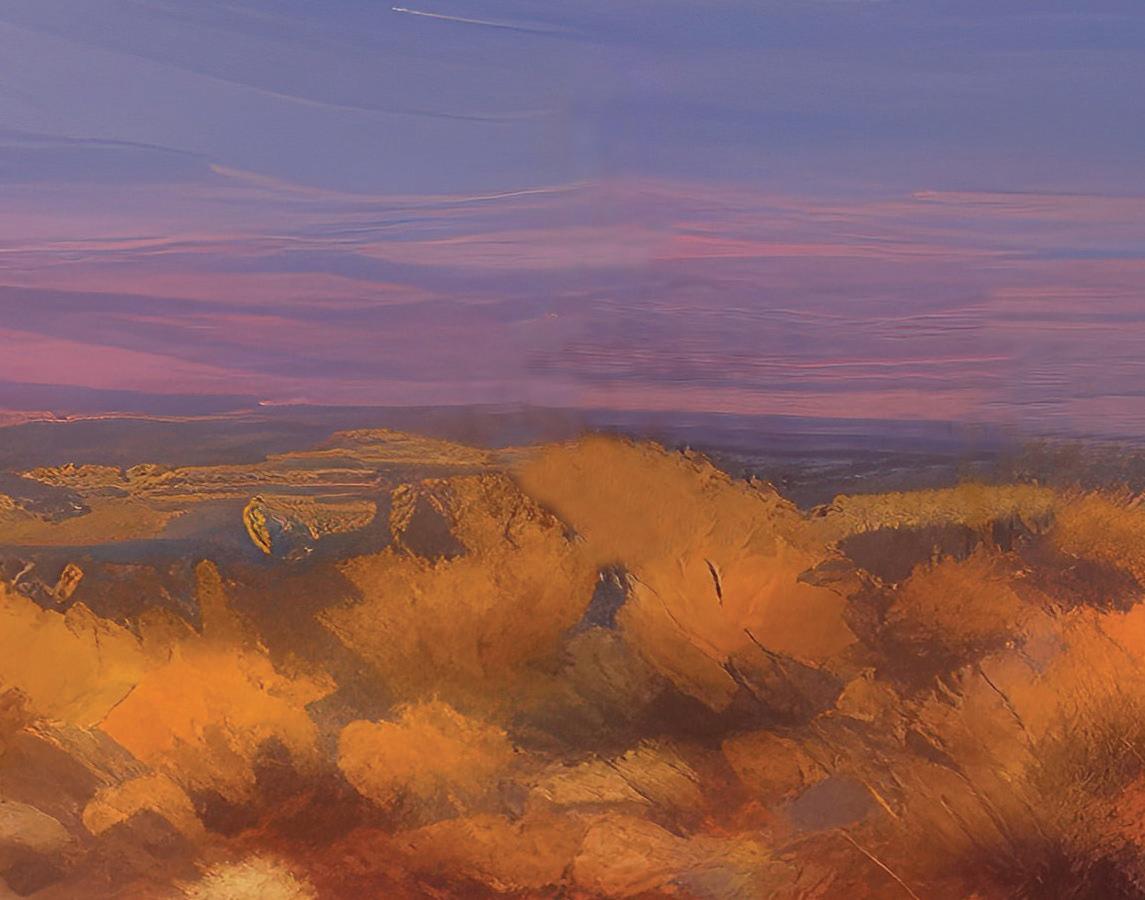

Jay Zweig
AV sponsored in part by Event Smart
Alcohol sponsored by Aly and Mark Koslow

